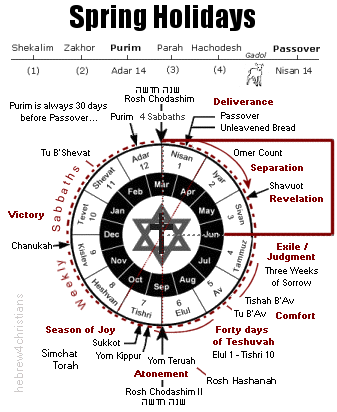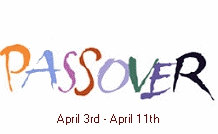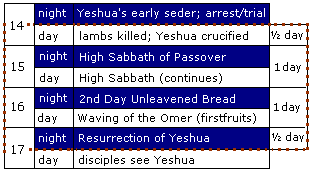|
Jewish Holiday Calendar
Note: For May 2015 site updates, please scroll past this entry....
Spring is the start of the Biblical Year and is marked by two of the Shelosh Regalim (three annual pilgrimage festivals): Pesach (Passover) and Shavuot (Pentecost). The holiday of Shavuot is held seven weeks (or fifty days) following the morning after Pesach.
The Spring Holidays:
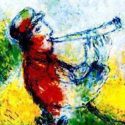
Note that in accordance with tradition, the following holiday dates begin at sundown:
- Month of Nisan (Fri., March 20th, 2015)
- Month of Iyyar (Sat. April 18th, 2015)
- Month of Sivan (Mon. May 18th, 2015)
Note: Many Jewish calendars will list the first day of a holiday without indicating that the holiday actually begins sundown the night before... So, for example, while Passover begins Friday April 3rd at sundown, many calendars will indicate it occurs on Saturday, April 4th...
Dates for Passover 2015:
Free Seder Guide
May 2015 Updates
Parashat Beha'alotekha - בהעלתך
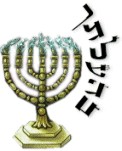
[ The Torah reading for this coming Shabbat is parashat Beha'alotekha... ]
05.31.15 (Sivan 13, 5775) Our Torah portion this week (Beha'alotekha) begins with God giving instructions about how Aaron was to service the lamps of the Menorah within the Holy Place of the Tabernacle (Num. 8:1-4). Each day Aaron was to clean each of the seven lamps and to refill them with the very purest olive oil. The wicks were then to be bent so that the six outer lamps shined toward the seventh (and central) shaft. The lamps were to be lit daily, "from evening until morning," in a specific sequence - starting from the central lamp (the shamash) and then moving right to left (Exod. 27:21). According to the Talmud (Shabbat 22b), while all the lamps received the same amount of olive oil, the central lamp miraculously never ran out of oil, even though it was kindled first in the sequence. This miracle is also reported to have occurred during the Temple period, though it abruptly ended about 40 years before the destruction of the Second Temple (c. 30 AD), after the death of Yeshua the Messiah, the true Servant and Branch of the LORD. As it is attested in the Talmud: "Our Rabbis taught: During the last forty years before the destruction of the Temple the lot ['For the Lord'] did not come up in the right hand; nor did the crimson-colored strap become white; nor did the centermost light shine" (Yoma 39a).
The portion next describes how the Levites were to be set apart for service at the Tabernacle (Num. 8:5-12). In a ceremony that signified a sort of "rebirth," they were first sprinkled with mei hachatat (מֵי חַטָּאת), literally, "the waters of sin" (Num. 8:7), that is, the water mixed with the ashes of the red heifer that purified from contamination with death (Num. 19:13). Next they shaved off all their hair and were completely immersed in a mikveh (a bath containing flowing water). The steps of being sprinkled with purifying water, shaving off of all the hair, and being completely immersed in a mikveh are similar to the ritual for the cleansing of the metzora, or "leper" (Lev. 14:2-32). Rashi notes that each member of the community was required to place their hands on the Levites' heads, just as the hands were placed on the head of a sacrificial animal as it was slaughtered before the altar (Num. 8:10; Lev. 1:4, 3:2). The "waving" of the Levites by the High Priest likewise simulated the ritual of "tenufah" (תְּנוּפָה), that is, the waving of the guilt sacrifice (asham) offered by the leper after his cleansing (Lev. 14:12). Finally, the Levites themselves were to lay their hands on sin and whole burnt offerings to make atonement before the LORD (Num. 8:12).
For more on this Torah reading, see the Beha'alotekha study pages and the related links. You can download the Shabbat Table talk for this week's reading here:
Bearers of Peace...

[ The following is related to this week's Torah reading, parashat Naso ("lift up!")... ]
05.29.15 (Sivan 11, 5775) Our Torah reading for this week gives us the ancient priestly blessing, the great expression of hope and grace that transforms us into "name bearers" of God. The blessing of the LORD guards us from illusion, directing our hearts to focus on what matters most. God's radiance changes us, revealing the miracle of grace. As God "lifts up his face," he discloses his Presence within all things, and imparts to us his healing peace. God's Name is "put upon" us so that we become vessels that carry redemptive love and healing to the world. We are endowed with divine energy to be made fruitful; we are empowered to serve God in the truth. The consciousness of our blessedness touches every moment, and we begin to see all of life as sanctified, sacred, full of wonder and meaning.
יְבָרֶכְךָ יְהוָה וְיִשְׁמְרֶךָ
יָאֵר יְהוָה פָּנָיו אֵלֶיךָ וִיחֻנֶּךָּ
יִשָּׂא יְהוָה פָּנָיו אֵלֶיךָ וְיָשֵׂם לְךָ שָׁלוֹם
ye·va·re·khe·kha Adonai ve·yish·me·re·kha;
ya·eir Adonai pa·nav e·ley·kha vi·chun·ne·ka;
yis·sa Adonai panav e·ley·kha ve·ya·sem le·kha sha·lom

"The LORD bless you and guard you;
The LORD make his face to shine upon you and be gracious to you;
The LORD lift up his countenance upon you and give you peace."
(Num. 6:24-26)

Download Study Card
Note: The "light of his face" is an idiom that describes when a king gives a subject direct audience, and the "lifting up of his face" means the king looks approvingly and with favor... The allusion is not merely that the king tolerates the subject or is appeased, but rather than he is full of good will and extends to him friendship and peace.
Shabbat Shalom and may God's Name rest upon you, dear friends... Amen.
The Madness of Sin...

[ The following is related to this week's Torah reading, parashat Naso ("lift up!")... ]
05.29.15 (Sivan 11, 5775) From our Torah reading this week (i.e., parashat Naso) we read, "If any... goes astray and breaks faith..." (Num. 5:12). The Talmud comments that "goes astray" (i.e., tisteh: תִשְׂטֶה) is written so it may be read "goes insane" (i.e., tishteh: תִשְׁטֶה), and concludes that sin is a form of insanity, that is, a denial of what is real, and therefore a state of delusion. We are required, of course, to believe that God is knowable (Rom. 1:19-20), that we are always in His presence (Prov. 15:3; Psalm 94:9; 139), that He knows all things (Psalm 147:5), and nothing can be hidden from Him (Isa. 40:28; Jer. 23:24; Heb. 4:13), but when we sin, we "break from" this reality and deny the divine Presence by a perverse act of self-exaltation. Whenever we imagine that we are unseen by God or whenever we "forget" that we live, move, and have our being in His presence, we are denying reality. Our sin causes us lose sight of what's real: we forget who God is; we forget who we are; and we exile ourselves from the Source of life... Surely sin is a form of insanity, and therefore we have a moral and spiritual obligation to think clearly and to value truth.
Everyday Revelation...

[ The following is related to the holiday of Shavuot, which began last Satuday night... ]
05.29.15 (Sivan 11, 5775) The Kotzker rebbe asked, "Why is Shavuot ("Pentecost") called 'zman mattan torateinu,' the time of the giving of our Torah, rather than 'zman kabbalat torateinu,' the time of the receiving of our Torah? The reason is that on that momentous day at Sinai, only the giving of the Torah occurred, whereas the receiving of the Torah must take place each and every day, as it says, "Trust in the LORD 'bekhol libbekha' (בְּכָל־לִבֶּךָ) - with all your heart; and know Him 'bekol derakhekha' (בְּכָל־דְּרָכֶיךָ), in all your ways" (Prov. 3:5-6). The giving of the Torah is described as a "loud and never-ending voice" (Deut. 5:19), though it is our constant responsibility to shema – to receive the invitation of God's heart.
בְּטַח אֶל־יְהוָה בְּכָל־לִבֶּךָ
וְאֶל־בִּינָתְךָ אַל־תִּשָּׁעֵן
בְּכָל־דְּרָכֶיךָ דָעֵהוּ וְהוּא יְיַשֵּׁר ארְחתֶיךָ
be·tach · el · Adonai · be·khol · lib·be·kha
ve'el · bi·na·te·kha · al · tish·a·en
be·khol · de·ra·khe·kha · da·ei·hu · ve·hu · ye·ya·sher · or·cho·te·kha

"Trust in the LORD with all your heart,
and do not lean on your own understanding.
Know Him in all your ways, and He will straighten your paths."
(Prov. 3:5-6)

Hebrew Study Card
"Trust in the LORD with all your heart... know Him in all your ways." The Hebrew word for trust is "bittachon" (בִּטָחוֹן), from a root word (בָּטָח) that means "to lean upon," to feel safe and secure.... Bittachon describes emotional acceptance of the goodness of the LORD. Some of the sages have said that while emunah (אֱמוּנָה), or "faith," represents a state of cognitive understanding (בִּינָה) that God is involved in all the events of the universe, bittachon means emotionally trusting that the Lord is present in every situation for your good.... Rabbi Bechaya put the distinction this way: "Everyone who trusts has faith, but not everyone with faith trusts." Bittachon is an intuitive awareness of the personal love of God for your life, coupled with complete trust that He deeply cares for you (Rom. 8:28). It is an expectation that the love of God is "I-AM-always-with-you," too.
Receiving the Blessing...
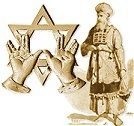
[ The following is related to this week's Torah reading, parashat Naso ("lift up!")... ]
05.28.15 (Sivan 10, 5775) The LORD spoke to Moses, saying, "Speak to Aaron and his sons, saying, 'Thus you shall bless the people of Israel, saying: "May Adonai bless you and keep you from illusions; may Adonai shine divine light upon you; may Adonai reveal his faces to you.' So shall they set my Name upon the people of Israel, and I will bless them" (Num. 6:22-27). The question is asked why the priests were needed to confer God's blessing, and what is meant by the idea of God "setting his Name" upon the people. The sages reply that the blessing is bestowed by a mediator to show that all things flow from the Holy One, and there is no one who can rightly say, "by my strength and my power alone has this come to pass" (Deut. 8:17). Therefore the blessing is graciously given to those who simply open their hearts to receive it: "May Adonai bless you; may Adonai shine divine light upon you; may Adonai reveal his faces to you..." Everything that comes to us comes in God's Name, as it is written: "Every good gift and every perfect gift is from above, coming down from the Father of Lights (אֲבִי הָאוֹרוֹת) with whom there is no variation or shadow due to change" (James 1:17). The blessing of God (בִּרְכַּת יָהּ) is to "bear His Name" by being filled with the strength of His Presence, walking in the flow of His power, completely in union with His will...
Note: For more on this subject, see "The Hebrew Priestly Blessing."
The Prophet like Moses...
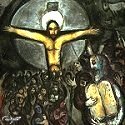
05.28.15 (Sivan 10, 5775) In our Torah portion for this week (i.e., parashat Naso) we read, "And when Moses went into the tent of meeting to speak with the LORD, he heard the Voice speaking to him from above the mercy seat (i.e., kapporet: כַּפּרֶת) that was on the ark of the testimony, from between the two cherubim; and it spoke to him" (Num. 7:89).
Now Moses was truly an extraordinary and wonderful person -- Israel's first great prophet, priest, and king. His life can be divided into three great distinct periods of 40 years each. First, he was raised as an Egyptian and lived as a prince of Egypt (the Egyptian period); second, he fled to the land of Midian where he became a shepherd and encountered God in the desert (the Midianite period); and third, after the great deliverance from Egypt, Moses led the people back to Sinai where he 1) became the mediator (priest) of the covenant between God and Israel, 2) legislated the various laws of the Torah, and 3) received the prophetic vision of the Tabernacle, the future exile, and the ultimate glory of Zion.
Notice, however, that Moses was extraordinary in the sense that he transcended the entire system of religion that was later established as Judaism. First, as the great legislator, Moses stood outside of the law, serving as its voice of authority. Second, as the high priest of Israel, Moses instituted various sacrificial rites before the laws of sacrifice were enacted. For example, he instituted the Passover sacrifice in Egypt (Exod. 12:1-11), and when the people later reached Sinai, he offered blood sacrifices to ratify the terms of the covenant (Exod. 24:8). Moreover, he ascended the mountain and received the prophetic vision of the Sanctuary before the priesthood had been instituted in Israel (Exod. 25:8-9). And even after the laws of the priests were enacted and the Tabernacle was erected, Moses was allowed to go before the very Holy of Holies to hear the Voice of the LORD, even though technically speaking this was forbidden, since Moses was not a kohen (i.e., descendant of Aaron).
"A prophet like unto me..." (Deut. 18:15). I mention this because some Jewish people stumble over the fact that Yeshua, who was from the tribe of Judah, served as Israel's High Priest of the New Covenant. Of course this issue is addressed in the Book of Hebrews, where the role of the Malki-Tzedek priesthood is ascribed to King Yeshua (Heb. 5:6-11; 7:1-19), but it is important to realize that Moses himself foresaw the coming of the Messiah as Israel's great prophet, priest and King (Deut. 18:15-19; John 5:36). Indeed, just as Moses himself was "outside" the law by serving as Israel's priest but nevertheless was commissioned by God Himself, so also with Yeshua, who instituted the sacrifice of His blood as the Lamb of God and who went directly before God's Throne to intercede on our behalf.
Note: For more on this subject, see "Moses' Prophecy of the Messiah."
All Sin is Theft...

[ The following is related to this week's Torah reading, parashat Naso ("lift up!")... ]
05.27.15 (Sivan 9, 5775) In our Torah for this week (Naso), God instructed that anyone who had "wronged" another was to confess their sin, make restitution for the full amount (plus one-fifth), and to present a guilt offering for atonement (Num. 5:5-7). The sages wondered why confession of sin (viduy) was linked with stealing and restitution, and answered that since sin abuses the life we have been given, it must ultimately be understood as a form of theft against God... For instance, we are not to use our eyes to look upon indecency or our ears to listen to lashon hara (evil speech), and should we do so, we are using our bodies and minds in forbidden ways... Arrogating our will "steals from" the lease on life we have been given by God...
Confession of our Hope...
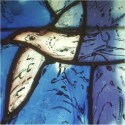
05.27.15 (Sivan 9, 5775) It is written: "Faith is the foundation (i.e., ὑπόστασις: the "substance," reality, being, etc.) of hope, the conviction of the unseen... Without faith it is impossible to please God, for whoever would draw near must believe that God exists and rewards (μισθαποδότης) those who seek him" (Heb. 11:1,6). Note that God is pleased when we seek his presence, that is, when we when we look past the ephemera and ambiguity of the phenomenal world for the truth about spiritual reality. For our part, faith depends on confession. We must say that we believe, and affirm it with all our heart (Rom. 10:9). As it says, "I will make Your faithfulness known with my mouth" (Psalm 89:2). When you encounter tribulation, or experience some crisis of faith, reaffirm aloud: "I believe in God's promise..." Physically expressing your faith is itself an act of faith, and this encourages your soul to trust in God's healing reward even in the present struggle or darkness.
One of the more difficult tests of faith is learning to "endure yourself" as your inner character is being transformed by the mercy of God... To do so, you must receive the miracle of life in Yeshua (1 John 5:12). You must look beyond the realm of appearance, where the "outward man" perishes, to the realm of ultimate healing, where the "inward man" is finally liberated from the ravages of sin and death. This is the comfort we have in our affliction: God's promise revives our hearts to say, "I know that my Redeemer lives, and at the last he will stand upon the earth" (Job 19:25). Even in the "shadow of the valley of death" (i.e., this moribund and broken world), the LORD is with us and comforts us with His Presence (Psalm 23:4). We are given this great promise: "Just as we have borne the image of the man of dust, we shall also bear the image of the man of heaven" (1 Cor. 15:49).
Dear Lord, in the worst of our moments, thank you for seeing the Savior within us; thank you for heeding the groaning of hope that the Spirit imparts.... "When my heart was embittered, when I was pierced in heart, I was brutish and ignorant; I was like a beast toward you. Nevertheless, I am always with you; You hold my right hand" (Psalm 73:21-23). Despite this lament, however, the psalmist affirmed that he was always with God - notwithstanding his ignorance, his complaint of heart, his doubts, fears, and so on... God is not driven away by our pain and confusion, but on the contrary, he takes us by the hand and will not let go: "It was I who taught Ephraim to walk; I took them up by their arms, but they did not know that I healed them" (Hos. 11:3).
שְׁמַע־יְהוָה קוֹלִי אֶקְרָא
וְחָנֵּנִי וַעֲנֵנִי
she·ma · Adonai · ko·li · ek·ra
ve'chon·nei·ni · va'a·nei·ni

"Hear, O LORD, when I cry aloud;
be gracious to me and answer me"
(Psalm 27:7)

Of course it's not always easy to wait for God, especially when we are in pain or anxiety, but we must never, ever, give up; we must never ever, abandon our heart's longing for ultimate healing. Therefore the Spirit cries out: come alive and trust in the promise of God; receive the heavenly gift. Ve'yesh tikvah le'acharitekh (וְיֵשׁ־תִּקְוָה לְאַחֲרִיתֵךְ): "There is hope for your future," declares the LORD (Jer. 31:17). "Blessed are you, LORD our God, King of the universe, who makes us prisoners of hope" (אֲסִירֵי הַתִּקְוָה). Friends, Let us hold fast the confession of our hope without wavering, for he who promised is faithful" (Heb. 10:23).
Receiving what you give...
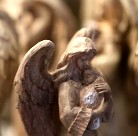
[ The following is related to this week's Torah reading, parashat Naso ("lift up!")... ]
05.27.15 (Sivan 9, 5775) From our Torah portion this week we read: "Each one shall keep his holy donations: whatever anyone gives to the priest shall be his [לוֹ יִהְיֶה]" (Num. 5:10). This is the spiritual principle that what we give away is what we possess, and as we measure, so will be measured back to us again (Luke 6:38). The sages comment that being selfish, acquisitive, and power-hungry are drives common among the animals, but what makes a man unique is his ability to sacrifice himself for others. Giving tzedakah, then, is an inherently spiritual act, and ultimately only that which we give to others in love will be kept as holy. "For where your treasure is, there your heart will be also" (Matt. 6:21).
As you believe, so you will receive (Matt. 21:22). This is the "like for like" principle of faith. Forgive us as we forgive; judge us as we judge; love us as we love; make us righteous as we take hold of righteousness, give us courage as we believe, and so on. As Isaiah said to Ahaz: "If you will not be firm in faith, you will not be firm at all" (Isa. 7:9). Your "amen" echoes the "amen" of heaven: "Let it be done for you according to your faith" (Matt. 9:29).
Instead of refusing to judge others (in the name of tolerance), or judging them in terms of their worth, we are commanded judge people favorably by using a "good eye" (עַיִן טוֹבָה). As it is written in the Torah, "in righteousness judge your neighbor (בְּצֶדֶק תִּשְׁפּט עֲמִיתֶךָ)" (Lev. 19:15). Notice that the word translated "righteousness" is tzedek (צֶדֶק), a word that includes the heart motive of "charity" and love. We are commanded to give tzedakah (צְדָקָה, "charity") not just because it is "right," but it is right because it is based on God's love and care for others. Something is righteous, in other words, because it expresses the truth about God's love. We could read this commandment as "in love judge your neighbor." Our judgments should be based on compassion, empathy, and care for others - never as a verdict about someone's worth and status before God. We see with a redemptive eye, and that means seeing the potential of others and their inherent worth as God's children.
Lord, help me receive what you give and give what I have received, for love's sake. Amen.
Loving the Stranger...

[ The following is related to this week's Torah reading, parashat Naso ("lift up!")... ]
05.26.15 (Sivan 8, 5775) In our Torah portion this week (Naso), God instructed that anyone who had wronged another was to confess their sin, make restitution for the full amount (plus one-fifth), and to offer an guilt offering for atonement (Num. 5:5-7). Notice, however, that this "law of restitution" applied not only to one's fellow Jew, but also to "strangers" (i.e., gerim: גֵּרִים) as is indicated by the immediately following verse: "But if the man has no next of kin to whom restitution may be made for the wrong, the restitution shall go to the LORD..." (Num. 5:8). The sages asked, "Is there anyone in Israel who has no next of kin - no brother, no nephew, no distant relation going back to Jacob? This can only refer, therefore, to a stranger, since he has no heirs" (Sifrei). If for some reason the stranger could not be compensated for his loss, restitution must be made to the LORD, which implies that stealing from the stranger is to steal from God Himself.
So even at the very beginning of Israel's national history we see God's care for the "stranger" who dwelled among his people. Regarding the law of Passover, the LORD stated, "There shall be one law (תּוֹרָה אַחַת) for the native and for the stranger who sojourns among you" (Exod. 12:49). "You shall treat the stranger who sojourns with you as the native among you, and you shall love him as yourself" (Lev. 19:34). The sages ask, why does God love the stranger? Because they have no hereditary or family title. If someone truly wants to become a righteous person, God honors them as if they were the very priests of Israel. Proselytes are what they are simply out of love for God, just as Ruth was made a mother of the Messiah by means of her love for God alone. As it is written, "The LORD loves the righteous; He protects the stranger."
יְהוָה אהֵב צַדִּיקִים יְהוָה שׁמֵר אֶת־גֵּרִים
יָתוֹם וְאַלְמָנָה יְעוֹדֵד וְדֶרֶךְ רְשָׁעִים יְעַוֵּת
Adonai · o·hev · tzad·di·kim, · Adonai · sho·mer · et · ge·rim
ya·tom · ve·al·ma·nah · ye·o·ded, · ve·de·rekh · re·sha·im · ye·av·vet

"The LORD loves the righteous; the LORD watches over the strangers; he upholds the widow and the fatherless, but the way of the wicked he turns upside down"
(Psalm 146:8-9)
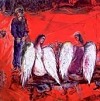
Concerning the obligation to love the stranger and treat him with righteousness, Rabbi Jeremiah said: "How can you know that the Gentile that practices the law is equal to the high priest? Because it is said, "which, if a man do, he shall live through them" (Lev. 18:5). And it says, "This is the Torah of man" (2 Sam. 7:19). It does not say, "the law of the priests, Levites, Israelites," but "This is the law of man (תּוֹרַת הָאָדָם), O Lord God." And it does not say, "Open the gates and let the priests and Levites and Israel enter," but it says: "Open the gates that the righteous may enter" (Isa. 26:2). And it says, "This is the gate of the Lord, the righteous shall enter it." It does not say, "The priests and the Levites and Israel shall enter it" (Psalm 118:20). And it does not say, "Rejoice you, priests, Levites, and Israelites," but it says,"Rejoice you righteous" (Psalm 33:1). And it does not say, "Do good, O Lord, to the priests and the Levites and the Israelites," but it says "Do good, O Lord, to the good" (Psalm 125:4). So even a Gentile, if he practices the Torah, is equal to the high priest (Sifra 86b; Baba Kamma 38a).
Did you know that one of the most frequently occurring commandments is for the Jew to love the stranger? The commandment is repeated in various forms over 30 times in the Jewish Scriptures, for instance "You shall love your neighbor as yourself: I am the LORD" (Lev. 19:18); "You shall treat the stranger who sojourns with you as the native among you, and you shall love him as yourself, for you were strangers in the land of Egypt: I am the LORD your God" (Lev. 19:34); "Love the stranger, therefore, for you were sojourners in the land of Egypt" (Deut. 10:19); "You shall not wrong a sojourner or oppress him, for you were sojourners in the land of Egypt" (Exod. 22:21); "When a stranger sojourns with you in your land, you shall not do him wrong" (Lev. 19:33); "Do not oppress the stranger" (Zech. 7:10); "Cursed be anyone who perverts the justice due the stranger" (Deut. 24:19); "The stranger shall be as the native born children of Israel among you" (Ezek. 47:22), and so on. Clearly the LORD does not want people to feel ostracized, excluded, or otherwise left out of His providential and loving plans...
The Blessing of Shalom...

[ The following is related to this week's Torah reading, parashat Naso ("lift up!")... ]
05.26.15 (Sivan 8, 5775) "May the LORD lift up his face upon you and give you peace" (Num. 6:26). That is, may the LORD "lift up his face" (יִשָּׂא יְהוָה פָּנָיו) toward you in welcome, and may his countenance be radiant with joy over you. May his face be "toward you," not turned away or hidden... When God turns toward you, he imparts the blessing without which all other blessings are beholden, namely, his peace (i.e., shalom). After all, what good is worldly prosperity or temporal pleasure apart from God's blessing of peace? To have shalom (שָׁלוֹם) is to be made shalem (שָׁלֵם) – made whole, complete, secure, happy – and therefore the peace of God (שְׁלוֹם הָאֱלהִים) is assuredly the most essential blessing.
Let me add that there is objective, God-established peace found in our Savior: "since we have been justified by faith, we have peace with God through Adoneinu Yeshua Mashiach" (Rom. 5:1). This is the reconciliation that God effected through the cross of Yeshua for our atonement (Rom. 5:11). God's love makes our eternal peace real, secure, and finished... There is also a subjective side of peace, however, that is a fruit of the Spirit of God: "But the fruit of the Spirit is love, joy, peace..." (Gal. 5:22). This is the inner peace that we experience by trusting in God's care for our lives, despite our struggles; such peace comes when we allow the Spirit of God to reign within our hearts by faith (Phil. 4:7; Col. 3:15).
Of course there is the reality of spiritual warfare, depression, anxiety, etc. that many of us face. Please let us pray for one another - that the peace of God, the blessing of God, would inwardly and genuinely be manifested within the hearts of all who call on the name of Yeshua for life... Let us seek, ask, and knock on heaven's door for help, chaverim yakarim.
Parashat Naso - נשא

05.25.15 (Sivan 7, 5775) Our Torah portion this week (parashat Naso) includes the famous blessing that Aaron and his sons (i.e., the priests) were instructed to recite over the people of Israel. The text of the blessing (Num. 6:24-26) begins with three words, is comprised of three parts, invokes the divine Name three times, and is therefore appropriately called "the three-in-one blessing." Notice that the words are spoken in the grammatical singular rather than plural because they are meant to have personal application, not to be a general benediction over a crowd of people. The phrase, "The LORD lift up His face toward you..." (יִשָּׂא יְהוָה פָּנָיו אֵלֶיךָ) pictures the beaming face of a parent as he lifts up his beloved child in joy... The repetitive construction of God "lifting up His face" (יְהוָה פָּנָיו אֵלֶיך) suggests that God's justice has been fully satisfied and His compassion now flows outward to the child in loving grace. Undoubtedly Yeshua recited this very blessing over his disciples when he ascended back to heaven, though of course He would have spoken it in the grammatical first person: "I will bless you and keep you (אני אברך אותך ואשמור לך); I will shine upon you and will be gracious to you; I will lift up my countenance upon you, and give you my shalom" (Luke 24:50-51).
יְבָרֶכְךָ יְהוָה וְיִשְׁמְרֶךָ
יָאֵר יְהוָה פָּנָיו אֵלֶיךָ וִיחֻנֶּךָּ
יִשָּׂא יְהוָה פָּנָיו אֵלֶיךָ וְיָשֵׂם לְךָ שָׁלוֹם
ye·va·re·khe·kha · Adonai · ve·yish·me·re·kha
ya·eir · Adonai · pa·nav · e·ley·kha · vi·chun·ne·ka
yis·sa · Adonai · pa·nav · e·ley·kha · ve·ya·sem · le·kha · sha·lom

"The LORD bless you and guard you;
The LORD make his face to shine upon you and be gracious to you;
The LORD lift up his countenance upon you and give you peace."
(Num. 6:24-26)

Download Study Card
Note: To learn more about this wonderful blessing, click here (you can also listen to it chanted by clicking here).
Memorial Day...

05.25.15 (Sivan 7, 5775) In the United States, "Memorial Day" is a national holiday observed on the last Monday of the month of May, that commemorates the sacrifice of those men and women who died in military service for their country. For those who have lost a loved one during their military service, please accept our heartfelt condolences and appreciation for your great sacrifice... And may the LORD God Almighty have mercy upon all the nations of the world - including the United States - by imparting the revelation of His Living Torah, Yeshua, as it says, "Where there is no vision, the people cast off restraint, but the one who keeps Torah is made happy" (Prov. 29:18). If there is no vision, there is no direction, and this can lead to moral and spiritual disorder, chaos, and bondage.
בְּאֵין חָזוֹן יִפָּרַע עָם
וְשׁמֵר תּוֹרָה אַשְׁרֵהוּ
b'ein · cha·zon · yip·pa·ra' · am
ve·sho·mer · to·rah · ash·rei·hu

"Where there is no vision, the people cast off restraint,
but the one who keeps Torah is made happy" (Prov. 29:18).

Download Study Card
Heart of Goodness...
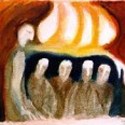
[ The great holiday of Shavuot ("Pentecost") begins sundown, Saturday May 23rd... ]
05.22.15 (Sivan 4, 5775) In the Ethics of the Fathers (Avot 2), the sages debated what was the most important attribute to become a suitable bearer of God's message on earth. One sage answered, having a good eye (ayin tovah); another said being a good neighbor, and another said being wise in one's deeds. Rabbi Elazar, however, said having a "good heart" was most important, which was agreed to be the best answer. Having a good heart is the foundation for spiritual life, but it is impossible to have such a heart apart from the miracle of the Holy Spirit. Note that the gematria of a "good heart," or lev tov (לֵב טוֹב), is 49, the number of days between Passover and the giving of the Holy Spirit at Pentecost. May God pour out His Spirit upon us so that we have the heart of Yeshua within us!
The Book of God...

05.22.15 (Sivan 4, 5775) "You shall count seven weeks... then you shall keep the Feast of Weeks to the LORD your God, and you shall rejoice before the LORD your God" (Deut. 16:9-11). The 49 days between the great Exodus and the revelation at Sinai are called yamim shel sefirah (יָמִים שֶׁל סְפִירָה), the "days of counting." As soon as Israel departed from Egypt they began to count the days until they would encounter God, as Moses had earlier promised, and their excitement climaxed when they arrived at Sinai on the third month after the Exodus (Exod. 19:1) -- just a few days before the anticipated 50th day ("Pentecost"). Note that the word "sefirah" ("counting") is composed of two separate words, "sefer" (סֵפֶר), meaning "book," and Yah (יָהּ), a name for God. During the 49 days we count down to the revelation of Torah, the Book of God, the Word of God, given to us on Shavuot.

Note that Shavuot is also called Yom Habikkurim (יוֹם הַבִּכּוּרִים), the "day of first fruits" , a time when the first crops of the land were to be offered at the Temple (Num. 28:26; Deut. 8:8). God calls Israel "my son, my first born son" (Exod. 4:22), which alludes to the idea of first fruits, since the word bechor (בְּכוֹר), "first born" and bikkurim (בְּכּוּרִים), "first fruits" share the same Hebrew root. Israel was to represent the first fruits of a redeemed humanity. The bechor (first born) was blessed to help others draw near to God for salvation. Likewise Yeshua is called "the image of the invisible God, the firstborn of all creation," indicating his role as the leader of a redeemed and re-created humanity (Col. 1:15).
Recall that the climax of the 49 days countdown was not the giving of the lawcode at Sinai, but rather the revelation of the altar (i.e., the Tabernacle) and its subsequent fulfillment in the sacrificial death of Yeshua as our Lamb of God. Moreover, it was during this time that Yeshua made His post-resurrection appearances to His disciples - and indeed ascended to heaven during this 49 day period... Of particular importance is the holiday of Shavuot, day 7x7 of the count, when the Holy Spirit (Ruach ha-Kodesh) was given to the disciples in fulfillment of the promise of Yeshua that we would not be left comfortless... Shavuot, then, marks the time of "Jubilee" of the Spirit, when are clothed with power from on high to serve the LORD without fear. We are new creations in our Messiah!
Remember who you are...

05.22.15 (Sivan 4, 5775) The haftarah for this coming Shabbat (i.e., Hosea 2:1-23) likens the Lord to a "jilted lover" who refuses to give up his passion for us. He loves us even in the filth of our depravity and redeems us from a life of shame; he zealously seeks us, takes us back, and restores us to a place of honor and joy... It is vital to understand that sin does not mean breaking God's law as much as it means breaking God's heart.
One of the greatest mistakes is to forget the message of who you really are and your beloved status before the LORD... "Fear not, for I have redeemed you; I have called you by name, you are mine" (Isa. 43:1). Forgetting who you are leads to forgetting who the LORD is, just as forgetting who the LORD is leads to forgetting who you are...
A verse from the Torah speaks to us along these lines: "You are children of the LORD your God (בָּנִים אַתֶּם לַיהוָה אֱלהֵיכֶם). You shall not cut yourselves for the dead. For the LORD has chosen you to be for him a treasured people (עַם סְגֻלָּה) out of all the peoples who are on the face of the earth" (Deut. 14:1-2). God regards us as his beloved children, and therefore we must trust him as a child trusts his father. We may not always understand all that our father does, but we believe in his good will toward us, even in the face of death itself. We must not engage in self-destructive mourning (or self-destructive habits based on mourning), because we are treasured by God and we trust in God's promises for eternal life (John 11:25). Because of this, excessive mourning, interminable gloom, self-destructive anger, or the refusal to let go of our fear may indicate a lack of faith in God's care as our Father. Remember that where it says "God works all things together for good," that includes even physical death... Let us therefore "hope to the LORD (קַוֵּה אֶל־יְהוָה); be strong and strengthen our heart; and (again) let us hope to the LORD" (Psalm 27:14).
Shabbat Shalom dear friends...
Moving Heaven and Earth...
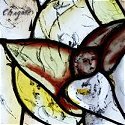
05.22.15 (Sivan 4, 5775) Act as if your choices have eternal significance; they do; pray as if your life depends on it; it does. Praying in accordance with the will of God - to know Him, to walk in the light of his love and to be filled with wisdom, patience, kindness, and so on, will assuredly move heaven and earth (1 John 5:14). God is faithful and always hears those who call out to him with sincerity of heart: "The LORD is near to all who call on him, to all who call on him in truth" (Psalm 145:18). Rouse then your heart! Boldly draw near to the throne of Grace to find help in your present hour of need (Heb. 4:16). Cry out to God Most High (לֵאלהִים עֶלְיוֹן), to the very One who will fulfill his purpose for you (Psalm 57:2).
קָרוֹב יְהוָה לְכָל־קרְאָיו
לְכל אֲשֶׁר יִקְרָאֻהוּ בֶאֱמֶת
ka·rov · Adonai · le'khol · ko·re·av
le·khol · a·sher · yik·ra·u·hu · ve·e·met

"The LORD is near to all who call on him,
to all who call on him in truth."
(Psalm 145:18)

Hebrew Study Card
"The LORD is near to all who call on him, to all who call on him in truth" (Psalm 145:18), which implies that honesty and truthfulness mark the very language of heaven. The language of heaven is truth spoken from a heart of trust...
Accounted by God...

[ The following is related to our Torah reading for this week, parashat Bamidbar... ]
05.22.15 (Sivan 4, 5775) Parashat Bamidbar is always read immediately before the great holiday of Shavuot (i.e., Pentecost), which is the time we celebrate "mattan Torah" -- the giving of the Torah of the LORD (first at Mount Sinai, later at Mount Zion). Central to Bamidbar is the counting of the person, identifying his "place" within Israel (Num. 1:52), and therefore the sages link the idea of being counted with the revelation of God itself. In other words, as we come to know who we are as God's redeemed people, as we learn to reckon ourselves as his beloved, so we will receive Torah and be accounted among his people. Our heads will be "lifted up," and we will receive the first blessing of Torah, namely: anokhi Adonai Elohekha (אָנכִי יְהוָה אֱלהֶיךָ), "I AM the LORD your (singular) God" (Exod. 20:2).
"The LORD spoke to Moses in the desert of Sinai... saying 'Lift up the head' (i.e., count) of the children of Israel (Num. 1:1). The Torah commentator Rashi insightfully noted that as we are counted, so we are lifted up and beheld by God. In other words your life matters to heaven, and you are counted worthy because of God's great redeeming love. The sages say that each of us is as a letter of Torah; each of us counts in God's book. Indeed our beloved Savior Yeshua said, "Even the hairs on your head are numbered" (Matt. 10:30).
May you lift up your head and be counted as one of God's own, friend....
The Center of our Journey...

[ The following is related to our Torah reading for this week, parashat Bamidbar... ]
05.21.15 (Sivan 3, 5775) Just as the Jews encamped in the desert around the holy Ark of the Covenant, which held the word of God and was sprinkled with sacrificial blood for atonement, so we sojourn our days focused on the Living Word of God, who offered up his own blood upon the heavenly kapporet for our eternal atonement. "For by a single offering (קָרְבָּן אֶחָד) he has perfected for all time those who are being sanctified" (Heb. 10:14). The sacrificial love of God is the central truth of reality: "For I decided to know nothing among you except Yeshua the Messiah and him crucified" (1 Cor. 2:2).
Celebrating our Need...

[ The following is related to our Torah reading for this week, parashat Bamidbar... ]
05.21.15 (Sivan 3, 5775) Our Torah portion this week begins: "The LORD spoke to Moses in the desert of Sinai, in the tent of meeting (ohel mo'ed), on the first day of the second month, in the second year after they had come out of the land of Egypt" (Num. 1:1). Note again that the LORD spoke in the desert (ba-midbar) of Sinai, and that the Hebrew word for "desert" (i.e., midbar: מִדְבָּר) shares the same root as the "word" (i.e., davar: דָּבָר), which suggests that we hear the Word of God in a place of emptiness, brokenness and ongoing need. But note further that the LORD spoke in the "tent of meeting" (אהֶל מוֹעֵד), which may be read as the tent of "mo'ed" (מוֹעֵד), or "holiday." We celebrate our need for God's healing and turn to him in a state of gratitude, even despite our sinful condition (Psalm 119:71). We take courage and draw near, renewed in trust. That is why the verse says it was "the first day of the second month" (חדֶשׁ הַשֵּׁנִי בַּשָּׁנָה) -- the word "month" (chodesh) can be read as "new" (chadash), suggesting it was a time of renewal, a time to celebrate a new beginning (Acts 2:1-4). When David prayed in his need: "Create in me a clean heart, O God, and renew a right spirit within me" (Psalm 51:10), the Hebrew may be read: "Create in me a pure heart, O God, and renew within me ruach nachon (רוּחַ נָכוֹן) - a spirit of "Yes!" As Paul said of Messiah our Healer: "For all the promises of God find their Yes in him" (2 Cor. 1:20).
Lessons in Waste Places...

[ The following is related to our Torah reading for this week, parashat Bamidbar... ]
05.20.15 (Sivan 2, 5775) How much energy is wasted going backward, returning to the same empty places? Yet we are creatures of habit; we tend to be lazy and we avoid examining our convictions and underlying assumptions; we are apt to ignore or explain way evidence that might challenge us, or - if we can no longer avoid the truth - we procrastinate and later "forget" the resolve to turn our heart to God in the truth. This way we can "hear" a commandment and yet postpone our action until later; we can agree to follow Messiah, but only in our own terms. Like Augustine, we pray: "Grant me chastity and continence -- only not yet..." And so we are turned back to emptiness because we refuse to go forward.
"We like to continue to believe what we have been accustomed to accept as true, and the resentment aroused when doubt is cast upon any of our assumptions leads us to seek every manner of excuse for clinging to them. The result is that most of our so-called reasoning consists in finding arguments for going on believing as we already do." - James Harvey Robinson (1863-1936)
Between bondage and the promised land lies the desert - a transitional place where we learn to depend on God's sustenance alone to bring us through... The "desert experience" can help liberate the soul from its past slavery, or it can reveal that the soul really does not want to be free. Hardship and testing reveal to us what we really believe, after all. It's one thing to be set free from what has once enslaved you, but it is quite another thing to live as a free person, conscious of your own liberty and dignity as a beloved child of God. And yet we are warned that if we don't turn away from what has enslaved us in the first place, if we don't learn to truly see ourselves as a new creation (בְּרִיאָה חֲדָשָׁה), it is likely we will be led back to a place of slavery once again.
Be encouraged, friends. If you feel lost in the desert, remember that it was there that God revealed himself to broken Moses... As it is written, "Who among you fears the LORD and obeys the voice of his servant? Let him who walks in darkness and has no light trust in the name of the LORD and rely on his God" (Isa. 50:10). Yeshua is our Good Shepherd who promises to guide our way to the high country of Zion (Psalm 23; John 10:14-16).
Beatitudes of Humility...
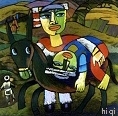
05.20.15 (Sivan 2, 5775) "Blessed are those who weep while the world goes on laughing, for theirs is the kingdom of heaven; blessed are the meek, for they shall overcome; blessed are those who realize they know little, for they shall find treasure; blessed are those who realize they are unrighteous, for they shall find healing; blessed are the misfits who are disowned by the world as fools, for they shall find mansions in heaven; blessed are the weak, for they shall be made strong; blessed are those who weep, for they shall obtain eternal consolation; blessed are those who refuse to assimilate into this world and its idols, for they shall be called victors in the world to come..."
God turns everything "upside down," for what is esteemed in this world is regarded as vanity in the world to come, and vice-versa. Indeed, the wisdom of this world is based on what I have called the "devil's logic," that is, the cynical notion that "truth" is nothing more than a political tool used to exploit others. The devil's logic is devoid of transcendental reality and therefore relies on compromise and "tolerance" to define truth as a form of "consensus" and "group think." Invariably this approach leads to ambiguity, confusion, cowardice, violence, absurdism, madness, and cruelty...
The Scriptures teach, "Light is sown for the righteous (tzaddikim), and joy for the upright (yashar) in heart" (Psalm 97:11). May it please the LORD God to renew our courage to live wholeheartedly according to His truth, and to resist the pressure to conform to the idolatry of this world. Amen.
Revelation and Study...
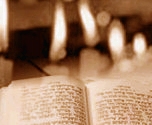
05.20.15 (Sivan 2, 5775) Some of the sages have made a connection between the Ten Days of Repentance (the time between Rosh Hashanah and Yom Kippur) and the seven weeks of the Omer Count (the time between Passover and Shavuot). Studying God's revelation is a prelude to re-experiencing the joy of His Presence, though this of course requires diligence and hard work. In order to understand what God requires of us, then, we must make an honest effort to study the truth of Torah and to practice it in our lives...
In Hebrew the word chinukh (חִנּוּךְ) means "education," a word that shares the same root as the word "chanukah" (חֲנֻכָּה, dedication). Unlike the ancient Greek view that pragmatically saw education as a humanistic means of escaping from "the cave of ignorance" to better one's personal power or happiness (Plato), the Jewish idea of education implies dedication to God and His concrete purposes on the earth. For example, the Rambam notes that the word chinukh is borrowed from the Torah's description of dedicating a tool for use with the Holy Altar, "habituating the tool for its work." In other words, godly education is a process of being made a "fit vessel" for the service of God in the world. All other ends of knowledge ultimately exist for this purpose, and rightly understood, education is a form of worship.
בְּאֵין חָזוֹן יִפָּרַע עָם
וְשׁמֵר תּוֹרָה אַשְׁרֵהוּ
b'ein · cha·zon · yip·pa·ra' · am
ve·sho·mer · to·rah · ash·rei·hu

"Where there is no vision, the people cast off restraint,
but the one who keeps Torah is made happy" (Prov. 29:18).

Download Study Card
May God make Torah sweet on our tongues and to help us be "engrossed" in the words of the Scriptures. There is no real blessedness apart from the truth of the Holy One...
I Need Thee Every Hour...

[ The following is related to the holiday of Shavuot, which begins in less than a week... ]
05.19.15 (Sivan 1, 5775) Today is Rosh Chodesh Sivan, which means that the countdown from Passover to the climactic 50th day of Shavuot is nearly complete. The great Torah sage Moses Maimonides once wrote: "The counting from Passover to Shavuot is carried out as one who waits for the coming of the human being he loves best, counting the days and hours." If the Passover redemption is incomplete without the giving of the Torah at Sinai, how much more is redemption given by the Messiah, the true Lamb of God, incomplete without the advent of the Spirit? The cross leads to the revelation of "deeper Torah," imbued by the inward power of the Holy Spirit that quickens our hearts to long for the coming of our Beloved Savior and the establishment of his kingdom over all the earth...
Just as the giving of the Torah happened at one specified time, but the receiving of it happens all the time, "in every generation," the same may be said regarding the ruach, the Spirit: every day we must open our hearts to the Divine Presence... "I need Thee every hour." The study of Torah never ends, since we are never without need for the Teacher.
The commandment to sanctify the new moon of Sivan reveals that it is our responsibility to sanctify (i.e., observe) Biblical time in general. In other words, when we observe the month in which the Torah was revealed to Israel, we are acknowledging that time itself is rooted in the Biblical calendar with its divinely inspired cycle of festivals (i.e., the moedim). Since Rosh Chodesh Sivan historically marks the beginning of a month of great revelation, we humbly ask the LORD to help us prepare for the coming season of Shavuot:
יְהִי רָצוֹן מִלְּפָנֵיךָ יהוה אֱלהֵינוּ וֵאלהֵי אֲבוֹתֵינוּ
שֶׁתְּחַדֵּשׁ עָלֵינוּ חדֶשׁ טוֹב בַּאֲדנֵינוּ יֵשׁוּעַ הַמָּשִׁיחַ אָמֵן
ye·hi · ra·tzon · mil·fa·ne·kha · Adonai · E·lo·hei·nu · ve·lo·hei · a·vo·tei·nu
she·te·cha·desh · a·lei·nu · cho·desh · tov · ba·a·do·nei·nu · Ye·shu·a · ha·ma·shi·ach · A·men

"May it be Your will, LORD our God and God of our fathers,
that you renew for us a good month in our Lord Yeshua the Messiah.
Amen."

Download Study Card
Prelude to the Desert...

[ The following is a brief survey of the Torah as a "prelude" to our study of the Book of Numbers. Hopefully this will provide some overall context to the book as we read it again this year... ]
05.19.15 (Sivan 1, 5775) The Book of Genesis (i.e., Sefer Bereshit [סֵפֶר בְּרֵאשִׁית]) describes the creation of the world, the transgression of Adam and Eve, the promise of the coming Savior, and the subsequent lapse of the human race into godlessness and depravity. The wicked generations of Cain caused the world to be entirely steeped in anarchy and bloodlust, so that "every intention of the thoughts of man's heart was only evil continually." After ten generations, the LORD "had enough" and destroyed the human race by means of the great flood. Only Noah and his immediate family were spared. Noah had three sons, of whom God chose Shem to be the high priest of the remnant of the human race. From Shem's line would ultimately come Abraham, the father of the Jewish people. Of course Abraham had a son named Isaac, and Isaac later had a son named Jacob. From Jacob (who was renamed "Israel") were born twelve sons, each of whom became patriarchs of the twelve tribes of Israel. Jacob's treasured son Joseph, however, was sold into slavery by his envious brothers, but later God promoted him to great power in the land of Egypt. The Book of Genesis ends with Joseph's dramatic reconciliation with his family, who then emigrated to Egypt to escape a devastating famine in the land of Canaan. Before his death, Jacob blessed his sons and confirmed the coming of the Savior through the tribe of Judah.
The Book of Exodus (i.e., Sefer Shemot [סֵפֶר שְׁמוֹת]) describes how the family of Jacob (i.e., the twelve tribes of Israel) multiplied into a great nation while dwelling in the land Egypt. Eventually, however, the Egyptians came to regard these "outsiders" as a political threat and convinced the Pharaoh to enslave and to grievously oppress them. The book describes how God intervened on behalf of Israel and chose Moses (and Aaron) to confront the Pharaoh and to demand that the Israelites be set free. Pharaoh refused Moses' repeated appeals, however, despite plagues of warning visited upon the Egyptians. As a final act of judgment, God instituted the Passover and killed all the firstborn sons of the land of Egypt. Moses and the Israelites then fled from Egypt, crossing the Red Sea into the Midian desert as directed by the Pillar of Cloud and Fire. When the people finally convened at Mount Sinai 49 days later, they received the Ten Commandments, and Moses was called up the mountain to receive the vision of the Tabernacle. While Moses was on the mountain, however, the Israelites forged a Golden Calf and worshipped it, and God threatened to destroy the people. Moses successfully interceded on their behalf, however, and after a period of national teshuvah (repentance), the covenant was renewed. The remainder of the book describes the architectural details and the construction of the Tabernacle, which was finally assembled and consecrated a year after the Exodus from Egypt (i.e., on Nisan 1). The Book of Exodus ends with the Shekhinah Glory of the LORD filling the newly built sanctuary: "For the cloud of the LORD was on the Tabernacle by day, and fire was in it by night, in the sight of all the house of Israel throughout all their journeys."
Moses' brother Aaron had been selected to be the first High Priest of the Jewish people, and Aaron's sons were designated as Israel's priests. Since the Tabernacle was intended to symbolize God's Presence among the people, Moses undoubtedly instructed Aaron and his sons (along with the other Levites) about their forthcoming responsibilities. The Book of Leviticus (i.e., Sefer Vayikra [סֵפֶר וַיִּקְרָא]) is therefore called Torat Kohanim - the Law of the Priests - since it deals largely with the service of the priests in the Tabernacle (the book was probably originally written during the six months when the Tabernacle and its furnishings were being made). The laws of sacrificial offerings are therefore detailed, as well dietary laws, laws regarding purity and impurity, and specific rituals for purifying the sanctuary. Throughout the book the holiness of God is stressed, with the corresponding duty for the priests and the people to be holy themselves. Apart from the narrative concerning the days of the Tabernacle's consecration (i.e., the death of Aaron's sons), the book itself is somewhat "timeless," with an emphasis on the need for blood atonement and sacrificial rituals to draw near to God. Leviticus is the center, or "heart" of the Torah, and therefore is positioned the "midst" of the scroll, and in the midst of the scroll is the korban tamid -- the daily sacrifice of the lamb with wine and matzah. And in the midst of all that symbolism is very the heart of God who offers us his love, his healing, his atonement... The Book ends with a list of blessings for obedience and curses for disobedience to God's law.
Although it appears after the Book of Leviticus in the Torah scroll, the Book of Numbers (i.e., Sefer Bemidbar [סֵפֶר בְּמִדְבַּר]) picks up precisely where the Book of Exodus left off, with the Glory of the LORD hovering over Tabernacle as the Israelites camped at Sinai. The book opens: "The LORD spoke to Moses in the desert of Sinai, in the tent of meeting, on the first day of the second month, in the second year after they had come out of the land of Egypt, saying, take a census of all the congregation of the people of Israel, by clans, by fathers' houses, according to the number of names, every male, head by head" (Num. 1:1-2). After the adult men were counted (the result of 603,550 is identical to earlier number in the Book of Exodus (cp. Num. 1:45-46; Exod. 38:26-27)) - the tribes were meticulously arranged into military camp formation around the Tabernacle. It should be noted, however, that the narrative in the book is not presented in entirely chronological order, since later it is stated that Israel celebrated the Passover before this census was taken (cp. Num. 1:1-2; 9:1-5), and the commencement of the journey to the promised land began when the Divine cloud lifted from the Tabernacle and began moving towards the wilderness of Paran (Num. 10:11-12). Besides, very little is told us about the 38 years of wandering in the desert, though certain spiritually significant episodes are described in the text... At any rate, the purpose of the census appears to be military, and only true Israelites were allowed to fight in God's battles (i.e., the "mixed multitude" were eligible). However, despite being personally led by the Shekhinah cloud by day and the pillar of fire by night - with the Divine Presence encamping in their midst and protecting them on all sides - the Israelites repeatedly rebelled against the LORD. When the camp of Israel finally drew near to the promised land, the people lapsed in their faith and succumbed to the fears expressed by the faithless spies. This grave sin led to God's judgment that Israel's entry into the land would be delayed for an additional 38 years, during which time every person 20 years of age and older was fated to die in the wilderness (except for Joshua the son of Nun and Caleb the son of Jephunneh, the two spies who trusted in God). Truly it's been said that it was easier for the LORD to take the people out of Egypt than for Him to take Egypt out of the people.
Following this tragic judgment, God turned the people back to the desert and restated various laws regarding the Tabernacle. Moses' cousin Korach - joined by other prominent leaders of Israel - then rebelled by challenging God's designated leadership and calling for the people to return to Egypt. After God destroyed the rebels and vindicated the priesthood of Aaron and his sons, the people wandered in the desert for several more years. After further tests and failures of the people - including Moses' own lapse at Kadesh Barnea which led to his banishment from the promised land - the 38 year period of exile finally drew to a close. Another census was taken, and Joshua was commissioned to lead the people into the land. The Book of Numbers ends with the next generation of Israel beginning to conquer the region of Canaan east of the Promised Land.
Technically speaking, the Book of Numbers marks the end of the historical narrative of the Torah, since it briefly describes the Israelites arrival at the end of their journey, the impending death of Moses, and the appointment of Joshua as the new leader of the people (the Book of Deuteronomy presents Moses' final sermon before he died). In Jewish tradition, the book is generally not regarded as a book of law, though the sages discover various forms of "case law" in its pages (e.g., the case of the inheritance of the daughters of Zelophehad). Instead, the book functions as a warning of the need to adhere to God's Torah and to exercise faith in His provision for the people. It ends with a note of hope, as the surviving generation begins to take hold of God's promise and enter into the land...
On a "macro level," the Torah tells the story of our pilgrimage to Zion, the mountain of the LORD that will one day fill the whole earth.... Genesis describes our creation and fall; Exodus describes our bondage and deliverance; Leviticus describes the walk of holiness; and Numbers describes the test and refinement of our faith (Deuteronomy is "mishneh Torah," the retelling and review of the inner meaning of the first four books).
It has been rightly said that the Book of Numbers displays both the "goodness and the severity of God" (Rom. 11:22). The New Testament cites various acts of rebellion mentioned in the book as "parables" or examples that were recorded so that we might be warned to keep our faith resolute (1 Cor. 10:1-12; Rom. 15:4). The Apostle Paul wrote, "Now these things took place as examples (i.e., τύποι, "types") for us, that we might not desire evil as they did... they were written down for our warning (νουθεσία) on whom the end of the ages has come" (1 Cor. 10:6, 11). Part of the wonder of the story of the Exodus generation is that "the deeds of the fathers are signs for the children" (מַעֲשֵׂה אֲבוֹת סִימָן לַבָּנִים), which means that the stories recorded in the Torah are "immortal" patterns intended to teach us spiritual truth. The faithlessness of the Exodus generation is therefore an eternal warning of failing to genuinely possess the promises of God... As Paul further states in this connection, "Therefore let anyone who thinks that he stands take heed lest he fall" (1 Cor. 10:12). We stand by trusting in the goodness of God and therefore we are warned about the severe consequences of unbelief.
Likewise, the author of the Book of Hebrews warns that "Exodus generation" was forbidden to enter into God's rest because of their unbelief. "Take care, brothers, lest there be in any of you an evil, unbelieving heart, leading you to fall away from the living God. But exhort one another every day, as long as it is called 'today,' that none of you may be hardened by the deceitfulness of sin. For we have come to share in Messiah, if indeed we hold our original confidence firm to the end. As it is written, 'Today, if you hear his voice, do not harden your hearts as in the rebellion;" (Heb. 3:12-15). And again, "Therefore, while the promise of entering his rest still stands, let us fear lest any of you should seem to have failed to reach it. For good news came to us just as to them, but the message they heard did not benefit them, because they were not united by faith with those who listened" (Heb. 4:1-2).
May the Living God (אֵל חַי) give you the grace to trust in Him... May He forever keep you! May He guard you from the seduction of unbelief.... May you forever resist the temptation to lose your heart. Walk strong, chaverim! Be strong in the LORD and the power of His might!
Revelation of the Torah...

[ The following is related to the holiday of Shavuot, which begins Sat., May 23 at sundown... ]
05.19.15 (Sivan 1, 5775) During the holiday of Shavuot ("Weeks") we remember how the LORD graciously condescended to meet with the Jewish people at Sinai, and how all the people heard the Voice of God (קוֹל אֱלהִים) speaking from the midst of the fire (Deut. 4:33). This awesome event foreshadowed the great advent of the King and Lawgiver Himself, when the Eternal Word (דְבַר־יְהוָה) became flesh to dwell with us (Phil. 2:6-7; John 1:1,14), and it further foreshadowed the advent of the Spirit of Truth given to the disciples of Messiah (Acts 2:1-4). Any theology that regards God as entirely transcendent will have a problem with divine immanence, since the highness, holiness, and perfection of God will make him seem distant, outside of us, far away, and even unknown... Incarnational theology, on the other hand, manifests the nearness of God to disclose the divine empathy. Indeed, the LORD became Immanuel (עִמָּנוּ אֵל), "one with us," to share our mortal condition, to know our pain, and to experience what it means to be wounded by sin, to be abandoned, alienated, forsaken. The "Eternal made flesh" bridges the gap between the realm of Ein Sof (אין סוף), the Infinitely transcendent One, and the finite world of people lost within their sinful frailty. Of course we believe Adonai Echad (יְהוָה אֶחָד) - that the "LORD is One" - both in the sense of being exalted over all things but also in the sense of being compassionately involved in all things (Rom. 11:36). During Shavuot we celebrate the giving of the Torah both at Sinai, at Bethlehem (בֵּית לֶחֶם), and within our hearts. We celebrate that God is indeed the King and Ruler over all, but we further affirm that God's authority and rule extends to all possible worlds - including the realm of finitude and even death itself.
כִּי יְהוָה שׁפְטֵנוּ יְהוָה מְחקְקֵנוּ
יְהוָה מַלְכֵּנוּ הוּא יוֹשִׁיעֵנוּ
ki · Adonai · sho·fe·tei·nu · Adonai · me·cho·ke·kei·nu
Adonai · mal·kei·nu · hu · yo·shi·ei·nu

"For the LORD is our judge; the LORD is our lawgiver;
the LORD is our king; He will save us."
(Isa. 33:22)

Hebrew Study Card
Always the First Step...

05.19.15 (Sivan 1, 5775) There is a core element of your spiritual life that is all-determinative, that affects everything else, and that is the decision of whether you will choose to "show up," whether you will engage it's hope; and whether you will open your eyes and yield yourself to the light... And this is an ongoing decision. Therefore we read in the Torah: "If you walk in my statutes (אִם־בְּחֻקּתַי תֵּלֵכוּ) and observe my commandments and do them..." (Lev. 26:3). The sages note that unlike the holy angels, we must "walk out" the faith of our days, and therefore we are always moving either forward or backward. God's sun shines on the just and unjust alike (Matt. 5:45). Every human being lives by faith of some kind, and it is therefore impossible to opt out of the decision to "choose this day whom we shall serve" (Josh. 24:15). Indifference or apathy is as much a spiritual decision as is outright rebellion, and if we do nothing today to draw us near to the Lord, we will eventually regress and slip backward. This is all very sobering. "No one knows the day or hour," and that's why it is so vital to turn to God and be healed while there is still time. So turn today and bacharta ba'chayim (בָּחַרְתָּ בַּחַיִּים) - "choose life!" "For this commandment (of turning to God) is not hidden from you, and it is not far away... No, the matter is very near you - in your mouth and your heart - to do it" (Deut. 30:11-14; Rom. 10:8-13).
Hearing the Whisper...

[ The following is related to our Torah reading for this week, parashat Bamidbar... ]
05.18.15 (Iyyar 29, 5775) The Hebrew word midbar ("desert") shares the same root as davar (דּבר) which means "word." We often need to be alone to hear God speaking kol demamah dakkah (קוֹל דְּמָמָה דַקָּה) - "the sound of a low whisper" (1 Kings. 19:12), and the journey into the desert was God's way of separating His people to speak with them "privately," so to speak (Jer. 2:2). But to hear the word we must humble ourselves, and the desert (i.e., "word") of Sinai is therefore first of all the word of humility (עֲנָוָה). When God spoke Torah to Israel, it was from a nondescript mountain - a place of emptiness, brokenness and need. Indeed, another word for Sinai is "chorev" (חרֵב), a word that means dryness and desolation. That is the starting point -- not the lush places of a future paradise. We receive Torah "bamidbar" because we can only hear God's davar in a place of lowliness and inner quiet. God brings us to an arid place -- inhospitable, and dangerous -- to reveal our need for Him, to show Himself as our Sustainer. The way to Sinai is a necessary excursion to prepare us to look for the greater hope of Zion. May God help us heed the whisper of His Spirit...
Preparing for Revelation...

[ The following is related to the holiday of Shavuot, which begins May 23rd at sundown... ]
05.18.15 (Iyyar 29, 5775) A week is called shavu'a (שָׁבוּעַ) in Hebrew, from a root word sheva (שֶׁבַע) that means seven. Seven is the number of holiness and completion, and the first verse of Torah has seven words (בְּרֵאשִׁית בָּרָא אֱלהִים אֵת הַשָּׁמַיִם וְאֵת הָאָרֶץ). Moreover, in six days God created the heavens and the earth, but on the seventh day he rested and set it apart as sacred (Gen. 2:3). The holiday of Shavuot (שָׁבוּעוֹת), or "weeks," marks the "Jubilee of Passover," which occurs after we count 7x7 (49) days from the day following Passover until we reach Sivan 6 (which this year begins May 23rd at sundown). Since Shavuot occurs on the 50th day after Passover, the Greek translators of the Torah called it "Pentecost" (πεντηκοστή). Shavuot marks the goal or climax of Passover season, commemorating both the anniversary of the giving of the Torah at Sinai as well as the giving of the Holy Spirit to the followers of Messiah (Acts 1:8; 2:1-4).

According to the sages, Shavuot marks the culmination of the experience of redemption, sometimes called Atzaret Pesach, the "conclusion" of Passover. Since the Exodus from Egypt led to the revelation given at Sinai 49 days later, the goal of Passover was the giving of the Torah to the Jewish people. In other words, the LORD took the Jews out of Egypt so that they would be His own treasured people, holy and separated from the pagan cultures around them. Indeed, all of the mo'edim (holidays) of the biblical calendar are connected with this event, including the fall festivals of Rosh Hashanah, Yom Kippur and Sukkot.
It is an old custom to attend services during erev Shavuot and to stay the entire night listening to poems and reading selections from the Torah and from the Talmud (this custom is called tikkun leil shavu'ot: תִּקּוּן לֵיל שָׁבוּעוֹת, "rectification for Shavuot night"). This custom is observed to "repair" the night of Shavuot from the error of sleeping so soundly before the Torah was revealed at Sinai that God had to awaken the Jews with piercing shofar blasts, thunder, and lightning the following morning. After this all-night vigil, morning prayers are recited thanking God for the revelation at Sinai.

Jewish tradition teaches be'chol dor vador - that in every generation each person should consider him or herself as having personally received the Torah at Sinai. The climax of the Shavuot morning service is the recitation of the famous Akdamut poem followed by the reading of the Ten Commandments, when all the congregation stands to "relive" the experience at Sinai. A second Torah scroll is then taken out of the ark and the portion is read (Num. 28:26-31) that describes the sacrificial offerings made at the Temple during Shavuot, and the Haftarah (Ezek. 1:1-28; 3:12) concerns the amazing revelation of God in the form of the Throne/Chariot.
The holiday of Shavuot is one of the shelosh regalim (three major "pilgrimage festivals") commanded in the Torah (Exod. 23:14-17; Deut. 16:16) and therefore it reveals profound spiritual truth for followers of Yeshua (Luke 24:44; 2 Tim. 3:16). God did not want us to miss the significance of this holiday, since it expresses the freedom and truth of the New Covenant of Zion. From my family to you: Shavuot Sameach - "Happy Shavuot!" May this be a time of renewal and great joy in your lives....
Note: I am aware that some people insist that Shavuot must occur on a Sunday, following the Sadducee's interpretation that "the day after the Sabbath" (Lev. 23:15) refers to the first day of the week, rather than to the day following the Sabbath of Passover. This has been the historical position of most "mainline" Christian churches... Everyone can (and should) follow their own earnest conviction on this subject (Rom. 14:5). I follow the traditional Jewish interpretation to identify with the worldwide Jewish community, whereas others might begin the omer count starting on the first Sunday after Passover. I would urge everyone to exercise humility here, because there are genuine differences of opinion among people of good will on this subject. As it is written: "Knowledge puffs up, but love builds up. If anyone imagines that he knows something, he does not yet know as he ought to know; but if anyone loves God, he is known by God" (1 Cor. 8:1-3).
Parashat Bamidbar - במדבר
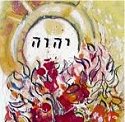
05.18.15 (Iyyar 29, 5775) Our Torah portion for this week, parashat Bamidbar (בְּמִדְבַּר), begins the Book of Numbers, where the narrative begins precisely where the Book of Exodus left off, with the glory of the LORD hovering over the Mishkan (Tabernacle) as the Israelites were stationed at Sinai. On the first day of the thirteenth month following the Exodus from Egypt – exactly thirty days after the Tabernacle was first consecrated – God commanded Moses to take a census of all Israelite males over 20 years of age who would bear arms. Moses and the heads of each tribe recorded the results, with 603,550 men in all. This number did not include the Levites, however, since they were designated to take care of the Tabernacle and its furnishings during the journeys.
God then gave instructions about how the Israelite camp was to be arranged. The Tabernacle would occupy the central location, with three clans of the Levites surrounding it on the north, south, and west (Moses and Aaron's tents were placed before the entrance on the east). The twelve other tribes were divided into four groups of three, each of which had its own flag and tribal leader's tent. All of the tents of the Israelites were to face the Tabernacle on every side. This camp formation was to be strictly maintained while traveling throughout the desert.
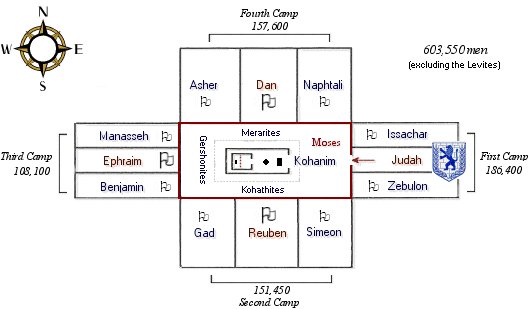 |
Each tribe had its own prince (nassi) and its own unique flag (degel), and each tribe's flag color corresponded with the color of its respective stone in Aaron's breastplate (Exod. 28:15-21). For example, Judah's stone was a sky-blue carbuncle and therefore the color of his flag was like the color of the sky with a "fiery lion" embroidered upon it (Gen. 49:9).
Led by the Shekhinah (שְׁכִינָה) cloud by day and the pillar of fire by night, at first the Israelites were en route to the Promised Land - the land of Canaan - which the LORD swore to give to Abraham and his descendants forever. However, the people rebelled (i.e., their complicity in the "Sin of the Spies") and were therefore condemned to wander for 40 years in the desert. This 40 year period is often thought of as a time of punishment, though it was also a time of refinement for the nation, and it was during this time that God demonstrated great love for Israel by feeding the people with manna, giving them water from rock (i.e., the so-called Well of Miriam), protecting them with the Clouds of Glory, instructing them through the teaching of Moses, and so on. God loves his people -- even when they are faithless -- and his punishments are ultimately healing and redemptive.
Note: Saturday, May 23rd (at sundown, i.e., after Shabbat) marks the end of the 49 days of counting and the beginning of the "Jubilee" of Shavuot (i.e., "Weeks" or "Pentecost").
Why Jerusalem Matters...
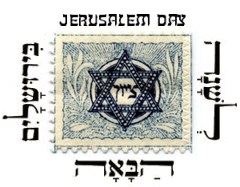
05.17.15 (Iyyar 28, 5775) Today is Iyyar 28, the anniversary of the date when Jerusalem was miraculously restored to the Jewish people after thousands of years of being under foreign control. This is significant to people of the LORD God of Israel (יהוָה אֱלהֵי יִשְׂרָאֵל) because Jerusalem is central to the Jewish heart. When religious Jews pray three times a day, they always turn toward Jerusalem (they also keep a small section of an eastern wall in their house unplastered and unpainted (mizrach) as a sign of mourning for the destruction of the Temple). Yeshua called Jerusalem the "City of the great King" (Psalm 48:2; Matt 5:35). It is the place where He was crucified, buried, resurrected, and from whence He ascended to heaven. One day (soon) Yeshua will physically return to Jerusalem as Mashiach ben David to restore the throne of King David. At that time, all the New Covenant promises given to ethnic Israel will be literally fulfilled as the Kingdom of God is manifest upon the earth.
In Jerusalem itself, thousands of people march around the city and walk through the liberated Old City, where Jews were denied access from 1948-1967. The march ends at the Kotel (Western Wall), one of the remaining retaining walls surrounding the Temple Mount, the holiest site in Judaism. At the Kotel, there are speeches and concerts and celebratory dancing to mark the day.
Friends, how can we forget Zion, "the city of the living God, the heavenly Jerusalem" (Heb. 12:22)? Is she not "our mother" (Gal. 4:26)? Are we not her citizens, indeed, her exiles in this age? As the psalmist said, "If I forget you, O Jerusalem, let my right hand forget its skill! Let my tongue stick to the roof of my mouth, if I do not remember you, if I do not set Jerusalem above my highest joy!" (Psalm 137:5-6).
אִם־אֶשְׁכָּחֵךְ יְרוּשָׁלָםִ
תִּשְׁכַּח יְמִינִי
im · esh·ka·chek · ye·ru·sha·la·yim
tish·kach · ye·mi·ni

"If I forget you, O Jerusalem,
may my right hand forget [its skill]"
(Psalm 137:5)

Hebrew Study Card
Some have said this verse should be read, "If I forget you, O Jerusalem, forget my right hand!" meaning that whatever good we might have (as symbolized by the right hand) should be lost apart from God Himself and the great vision of Zion. As King David had said, "I have set the Lord always before me; because he is at my right hand, I shall not be moved" (Psalm 16:8), so the loss of the right hand means the loss of the Divine Presence.
Note: Please click here to review 25 reasons why Jerusalem matters...
The Fear of the LORD...
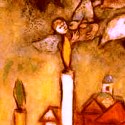
05.15.15 (Iyyar 26, 5775) Our Torah portion this week includes a litany of woes assured to befall those who spurn God's Torah or break covenant with Him (Lev. 26:14-46). The deeper intent of this admonition (tochechah) is to warn us of the danger of forfeiting our relationship with God – that is, of refusing to be healed of our illusions... Chastisement is a blessing from heaven, the "troubles of love," since its goal is to bring us back to God and to deliver us from loss. This is why Yeshua spoke about the dangers of hell: if we do not heed the Voice of divine love, we risk literally everything, and that loss is eternal... God's warning about hell expresses the great passion of his heart for us; his love calls us to receive eternal life and blessing, but if we refuse to come, we will suffer the loss of the only thing that ultimately matters. "It is a fearful thing to fall into the hands of the Living God" (אֱלהִים חַיִּים).
The fear of losing love evokes a healthy zeal to protect it from loss... The same may be said of God's relationship with us. The gospel represents God's passion for us, the call of his heart, his desire to elevate us to the role of the beloved, and we respond by accepting Him as the Lover of our souls, the Ultimate Concern of our life. Sin threatens to seduce us away from God's love, to interfere with our relationship, which evokes God's "jealousy" to protect love from loss. This is what the "fear of the LORD" (יִרְאַת יְהוָה) most radically means: God's own fear that we would lose sight of our great need for his healing love...
It is written that "perfect love casts out fear" (1 John 4:18), but perfect love (τελεία ἀγάπη) must be "perfect," that is, reciprocal, complete, consummated, and alive with passion. In Hebrew, perfect love is "shalem" - that is, whole, healed, and unified (אַהֲבָה שְׁלֵמָה). Perfect love is both given and received... It is not "perfect love" to intellectually accept that God loves you in Yeshua our Savior. No, you must receive this as an inward passion, you must live within it, must embrace it, take possession of it, and let it fill your heart to abundance. This love, this "perfect love," then will cast away your fear of being unwanted, rejected, and abandoned. But to know this love, you have to open your heart and accept it as your own, the essential reality of who you are:
אֲנִי לְדוֹדִי וְעָלַי תְּשׁוּקָתוֹ
a·ni · le·do·di · ve·a·lai · te·shu·ka·to

"I am my beloved's, and his desire is for me"
(Song 7:10)

We are told to "work out our salvation with fear and trembling" (μετὰ φόβου καὶ τρόμου) since the love of God appeals to all of our heart, soul, mind and strength.
Shabbat Shalom to you all... May you fully accept that you are accepted; may you receive the blessing of God's passion for your soul; may you walk (i.e., live, move, and have your being) in the abundance of God's unfailing and everlasting love. Amen.
Faith and Action...

[ The following is related to our Torah reading for this week, Parashat Behar-Bechukotai.... ]
05.15.15 (Iyyar 26, 5775) "If you walk in my decrees and heed my commandments and do them, then I will give you your rains in their season, and the land shall yield its increase, and the trees of the field shall yield their fruit" (Lev. 26:3-4). Note how doing and blessing are linked, and therefore the tzaddik (righteous person) becomes a conduit of goodness to the world itself: the rains will come in their season, the land will yield its increase, and the trees shall yield fruit... The contrapositive also holds however, since there is no real blessing apart from the realm of doing (John 13:17; Matt. 7:21; James 1:5). Simply learning (or "hearing") about Torah but not doing it is mere intellectualism, "head knowledge" but not "heart knowledge." We are to be "doers" of the truth, and not hearers only, deceiving ourselves (παραλογιζόμενοι, literally, "reasoning around the truth") (James 1:22). The truth of the heart is expressed by desire, by choosing, by passion; it is known in the struggle for good, for love, and for healing. We study and learn Torah to do Torah, and all our learning is for the sake of doing (Eph. 2:10). Note the order of the opening verse: "If you walk in my decrees (אִם־בְּחֻקּתַי תֵּלֵכוּ), and heed my commandments (וְאֶת־מִצְוֹתַי תִּשְׁמְרוּ) and do them (וַעֲשִׂיתֶם אתָם)." "Walking" here refers to the life of faith, since the decrees of God (chukkim) are "beyond reason," observed only by a heart that trusts. Faith is therefore the first step of all godly action, the foundation for the commandments. "This is the work of God, to believe in the One whom God has sent" (John 6:29). In other words, the very first work of God is to believe in the reality of His love as manifested in Yeshua our Savior, blessed is He.
The Troubles of Love...

[ The following is related to our Torah reading for this week, Parashat Behar-Bechukotai.... ]
05.15.15 (Iyyar 26, 5775) Parashat Bechukotai is the concluding portion of the Book of Leviticus (וַיִּקְרָא), which is the the central book of the Torah. In light of all that God had done for the Jewish people - from their great deliverance in Egypt to the ordination of the priesthood in the Tabernacle - God expected them to live up to their high calling as His chosen people: "You shall be holy, for I the LORD your God am holy" (Lev. 19:2). Therefore, some of the sages say that the central point of this concluding portion is tochachah (i.e., the warning of punishment) rather than nechamah (i.e., comfort). The focus is not, "If you walk in my laws" (Lev. 26:3), but rather, "if you do not listen (shema) to me" (Lev. 26:14).
It has been said that the opposite of love is not hate, but rather indifference, and that explains why the punishments would come if the people "left their first love." Indeed, the "rebuke" portion of the tochachah begins with v'im lo tishme'u li (וְאִם־לא תִשְׁמְעוּ לִי), "if you do not listen to me" (Lev. 26:14), which recalls the Shema and the duty to love the Lord bekhol levavkha, "with all your heart." If the people walk carelessly (i.e., keri: קְרִי) with God, then God will afflict them with "the troubles of love" (i.e., yissurei ahavah: יִסּוּרֵי אַהֲבָה). A student once asked his rebbe: "Do we get punished for our sins in this world?" His succinct response was, "Only if we are made fortunate..." The worst possible fate is for God to be indifferent to someone! Can anything be more tragic than to be forgotten or to go unnoticed by God? It is far better that He afflict you with yissurim shel ahavah - the "troubles of love!"
The tochachah of Bechukotai begins with 11 verses that promise blessings for obedience to God's laws, but three times as many (i.e., 33 verses) that promise punishment for disobedience. To help "offset" this discrepancy, the midrash notes that blessing section begins with the letter Aleph (in the word אִם) and ends with the letter Tav (in the word קוֹמְמִיּוּת), which suggests that the blessings encompass all other possible blessings (from Aleph to Tav). On the other hand, the punishment section begins with the letter the Vav (in the word וְאִם) and ends with the letter Hey (in the word משֶׁה), the last two letters found in the Sacred Name (יהוה), which suggests that God's compassion would be present even in the suffering to come in the latter days. Another way to look at this is to regard the letter Vav as the symbol of man, and the letter Hey as the symbol of the Spirit: in the end - after the punishments were complete - God's compassion would prevail over His judgment for sin, and the Spirit of God would rest upon Israel. The midrash further states during the days of the Messiah, Israel will keep the Torah, "from Aleph to Tav" (i.e., from beginning to end), and at that time all the blessings God promised to them would finally be fulfilled.
The idea of tochachah is not simply something for ethnic Israel, of course, since the New Testament likewise warns us that God will punish those who likewise walk carelessly (i.e., keri: קְרִי) with Him. Have you forgotten the exhortation that addresses you as God's children? "My son, do not regard lightly (ὀλιγώρει) the discipline of the Lord, nor be weary by his reproof (תּוֹכֵחָה). For the Lord disciplines the one he loves, and reproves (יוֹכִיחַ) every child whom he receives" (Heb. 12:5-6; Prov. 3:11-12). The Lord charged the assembly at Ephesus that they had let go of their first love. Yeshua therefore urged them: "Remember from what high state you have fallen and repent! Do the deeds (ἔργα) you did at the first; if not, I will come to you and remove your menorah from its place – unless you repent" (Rev. 2:4-5). Because God is never indifferent toward those who are trusting in His salvation, he will discipline and correct us to keep close to Him. He will afflict us with the "troubles of love." As it is written, "It is a fearful thing to fall into the hands of the Living God" (Heb. 10:30).
Regarding the list of punishments in this section, I'd like to relate a beautiful story I once read. The child of a famous Torah sage was used to hearing his father read the weekly Torah portion at synagogue, but on the Shabbat of Bechukotai his father happened to be out of town, and the boy listened intently as a substitute Torah reader recited the various punishments listed in the parashah. Startled and appalled at the severity of the curses of the tochechah (Lev. 26:14-39), he literally fainted in the middle of the reading. Afterwards, the boy was so emotionally distraught that he fell into a deep depression that lasted for over a month. The child was later asked, "Why were you not disturbed this way when the admonition was read in past years?" The boy replied, "When father reads it, no curses are heard." Yes, when "father reads," namely, the Father that sees our hearts in the darkest of places, we will hear His voice of blessing....
The Hebrew phrase gam zu l'tovah (גַּם זוּ לְטוֹבָה), translated as "this too is for good," expresses the idea that all things – including the various tribulations in our lives – ultimately can help us return to the Lord for healing and life (Rom. 8:28). The "tochechah," or the dreadful litany of curses, ends with the message of hope and ultimate redemption:
"But if they confess their iniquity and the iniquity of their fathers in their treachery that they committed against me, and also in walking contrary to me, so that I walked contrary to them and brought them into the land of their enemies -- if then their uncircumcised heart is humbled and they make amends for their iniquity, then I will remember my covenant with Jacob, and I will remember my covenant with Isaac and my covenant with Abraham, and I will remember the land. But the land shall be abandoned by them and enjoy its Sabbaths while it lies desolate without them, and they shall make amends for their iniquity, because they spurned my rules and their soul abhorred my statutes. Yet for all that, when they are in the land of their enemies, I will not spurn them, neither will I abhor them so as to destroy them utterly and break my covenant with them, for I am the LORD their God (כִּי אֲנִי יְהוָה אֱלהֵיהֶם). But I will for their sake remember the covenant with their forefathers, whom I brought out of the land of Egypt in the sight of the nations, that I might be their God: I am the LORD" (Lev. 26:40-46).
At the end of this parashah, as with every other parashah that concludes a book of the Torah, we say, Chazak, chazak, v'nitchazek - "Be strong, be strong, and may we be strengthened!" Despite the "heaviness" associated with the idea of God's judgment and punishment, we must press on in faith.... The great commandment is always "Choose Life!" (Deut. 30:19), and that life comes from being in a loving relationship with our Heavenly Father through our Yeshua our Savior, blessed be He (1 John 5:12). May God help us return to our first love for Him b'khol levavkha - with all our hearts. "I love those who love me; and those who seek me will find me" (Prov. 8:17). "The LORD is good to those who hope (קוה) for him, to the soul who seeks him" (Lam. 3:25).
The Great Rebuke...
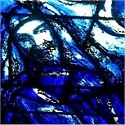
[ The following is related to our Torah reading for this week, Parashat Behar-Bechukotai.... ]
05.15.15 (Iyyar 26, 5775) This week's Torah portion (Bechukotai) includes the first great "rebuke" (i.e., tochachah: תּוֹכָחָה) of the community of Israel given in the Scriptures (the second is found in Ki Tavo, i.e., Deut. 28:15-68). In this sober and ominous section, God promises the people great blessing if they would obey Him (Lev. 26:3-13), but forewarns that exile, persecution and other progressively worse punishments would befall them if they would break faith with Him (Lev. 26:14-46). The sages note that divine censure would come if the people "forgot" about God or otherwise became careless in their observance of His laws. They point out that the refrain "if you walk contrary to me" (וַהֲלַכְתֶּם עִמִּי בְּקֶרִי) - which occurs several times during the great rebuke - really means "if you walk carelessly (i.e., keri: קְרִי) with me." Rashi notes that the verb karah (קָרָה) means "to befall" or "to happen" and therefore suggests a sense of randomness (the related word mikreh [מִקְרֶה] means "coincidence"). If the people began to regard the events of life as "random," then God would reciprocate by bringing senseless trouble into their lives... For this reason the sages regard a careless attitude about God's will as the very first step to inevitable apostasy. In other words, regarding whatever happens in life as mere "coincidence" essentially denies God's Presence, and this attitude will eventually call for God's corrective intervention. People can be "hot or cold" regarding their relationship with Him, but God will never give the option of affecting indifference toward Him... Indeed, God often brings hardship into our lives to regain our attention and cause us to return to Him. As C.S. Lewis once said, "God whispers to us in our pleasures, speaks to us in our conscience, but shouts in our pains: It is His megaphone to rouse a deaf world."
Blaise Pascal once wrote: "I can feel nothing but compassion for those who sincerely lament their doubt, who regard it as the ultimate misfortune, and who, sparing no effort to escape from it, make their search their principal and most serious business. But as for those who spend their lives without a thought for this final end, I view differently. This negligence in the matter where they themselves, their eternity, their all are at stake, fills me more with irritation than pity: yea, it astounds and appalls me..." (Pensees, 427).
For more on this topic see, "The Tochachah: Further thoughts on Parashat Bechukotai."
Owner of Reality...

05.14.15 (Iyyar 25, 5775) From our Torah this week (Behar) we read: "For you are strangers and sojourners (גֵרִים וְתוֹשָׁבִים) with me" (Lev. 25:23). When we are strangers to this world, we reside with God: we are called residents of heaven. To be a stranger to this world is a great blessing, since it means we identify our home in the heart of God. By extension, reality is measured by proximity to the Eternal, and the material world - when regarded as an end in itself - is nothing but an illusion, since it cannot exist apart from the sustaining power of God (Heb. 1:3; Col. 1:16-17; Rev. 4:11). The sages note that in Hebrew there is no language of categorical ownership, since all things are conditioned by time. We say yesh li (יש לי) - "there is to me" (for this time) rather than "I have" or own. Ownership is related to the "bone" (עֶצֶם) of something, its inner structure and essence. God alone is koneh shamayim va'aretz (קנֵה שָׁמַיִם וָאָרֶץ), the Owner of Reality (Gen. 14:9). "For from him and through him and to him are all things. To him be glory forever. Amen" (Rom. 11:36).
לְךָ יָאֶה אֲדנֵינוּ וֵאלהֵינוּ
לְקַבֵּל אֶת הַכָּבוֹד וְהַיְקָר וְהַגְּבוּרָה
כִּי אתָּא בָּרָאתָ הַכּל
וּבִרְצוֹנְךָ הָיוּ וְנִבְרְאוֹ
le·kha · ya·eh · a·do·nei·nu · ve·lo·hei·nu
le·ka·bel · et · hak-ka·vod · ve'ha-ye·kar · ve'ha-ge·vu·rah
ki · at·tah · ba·ra·ta · ha-kol
u·vir·tzon·kha · hai·yu · ve'niv·re·u

"You are worthy, O Lord and our God,
to receive the glory and the honor and the power:
for You have created all things,
and for thy pleasure they are and were created."
(Rev. 4:11)

Hebrew Study Card
Rest and Creativity...

[ The following is related to our Torah reading for this week, Parashat Behar-Bechukotai.... ]
05.14.15 (Iyyar 25, 5775) In our Torah portion for this week (i.e., Behar-Bechukotai), the LORD gave the people instructions about how they were to manage the promised land once they finally entered it. Instead of commanding the people to work hard to sustain themselves, however, God gave them laws of rest – of releasing their hold on the land (see Lev. 25:1-7). During the "Sabbatical years" (shemittah) the land was to lie fallow, and the people could eat only what was produced naturally, without any farming or organized harvesting. Letting go of the land required the people to trust that God was in control of nature's creative processes, and to acknowledge that the process of growth is mysterious and divine. As Yeshua said: "The Kingdom of God (מַלְכוּת הָאֱלהִים) is like someone who spreads seed on the ground. He goes to sleep and gets up, night and day, and the seed sprouts and grows, though he does not know how. By itself (αὐτομάτη, i.e., "automatically") the soil produces a crop, first the stalk, then the head, then the full grain in the head. And when the grain is ripe, he comes in with his sickle because the harvest has come" (Mark 4:26-29). In other words, the "ordinary" process of the growth of a seed is miraculous and is a gift from above. The Torah of the Sabbatical Year teaches us that creativity and fruitfulness requires that we let go and leave the outcome to God.
Keeping our Focus...
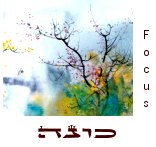
05.13.15 (Iyyar 24, 5775) The life of faith requires "kavanah" (כַּוָנָה), or concentrated focus: we "press on" (διώκω) to hear the upward call of God (Phil. 3:14). The problem for many of us is that we are irresolute, indecisive, and therefore we hesitate... A divided heart is at war within itself, "two-souled" (δίψυχος) and unstable in all its ways (James 1:8). If "purity of heart is to will one thing," then impurity of heart comes from simultaneously willing two things; it is therefore a state of inner contradiction, of having two separate "minds" or "wills" that hold contrary thoughts or desires. Yeshua said that "a divided house cannot stand," since it is not aligned with reality.... Ultimately how we choose to see is a spiritual decision: "If your eye is "single" (i.e., ἁπλοῦς, sincere, focused)," Yeshua said, "your whole body will be filled with light" (Matt. 6:22). Lord, heal my divided heart; shine your light upon me so I can behold you... "Teach me your way, O LORD, and I will walk in your truth; unite my heart in awe of your Name" (Psalm 86:11).
הוֹרֵנִי יְהוָה דַּרְכֶּךָ אֲהַלֵּךְ בַּאֲמִתֶּךָ
יַחֵד לְבָבִי לְיִרְאָה שְׁמֶךָ
ho·re·ni · Adonai · dar·ke·kha · a·ha·lekh · ba·a·mi·te·kha
ya·ched · le·va·vi · le·yir·ah · she·me·kha

"Teach me your way, O LORD, and I will walk in your truth;
unite my heart in awe of your Name."
(Psalm 86:11)

May it please God to heal us of such ambivalence by making our hearts whole, resolute, steadfast, full of conviction, and entirely awake to the glory of His Presence at our right hand (Psalm 16:8). The LORD is always near; he is not far from each one of us. "Draw near to God (ἐγγίσατε τῷ Θεῷ) and he will draw near to you; purify your hearts, you double-minded" (James 4:8). As it is written: "The LORD is near to all who call on Him, to all who call on Him in truth" (Psalm 145:18). May we be set free from lesser fears that divide the heart and rob the soul of shalom shelemah, God's perfect peace...
It is written in our holy Scriptures: "The darkness is passing away and the true light now is shining" - ἡ σκοτία παράγεται καὶ τὸ φῶς τὸ ἀληθινὸν ἤδη φαίνει (1 John 1:7). Abide in light as God is in the light... Understand that a primary stratagem of the devil is to tempt you to look anywhere else but to heaven for what you really need. "May God be gracious to us and bless us and make his face to shine upon us, Selah" (Psalm 67:1).
Strange Settlers...
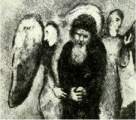
[ The following is related to our Torah reading for this week, Parashat Behar-Bechukotai.... ]
05.13.15 (Iyyar 24, 5775) Our Torah portion this week (i.e., parashat Behar) includes two laws that were intended to radically affect the social, economic, and spiritual well-being of Jews in ancient Israel. Regarding the laws of the sabbatical year (shemittah) and the Jubilee (yovel), the LORD states: "The land shall not be sold in perpetuity, for the land is mine, for you are strangers (גֵּרִים) and settlers (תּוֹשָׁבִים) with me" (Lev. 25:23). This is a paradoxical phrase, since a ger is one who is just passing through, like a visitor or tourist, whereas a toshav is one who is a resident, like a settler or citizen. But how can someone be both a visitor and a resident of a place, or a stranger and a citizen at the same time? How can one "pass through" a place he is said to dwell?
Concerning this paradox the Maggid of Dubna comments: "If you see yourselves in this world as strangers and remember that you are here only for a short visit, passing through the hallway of this world, then I will settle among you. However, should you see yourselves as settlers on this world, "owners" who are here to stay, then I am but a stranger among you. Either you are the settlers and I the stranger, or you the stranger and I the settler."
In other words, God "settles" among those who are exiles in this world... Those who "settle" here, who lay claim to this world, therefore make God their stranger. As James the Righteous warned, "Do you not know that friendship with the world is enmity with God? Therefore whoever wishes to be a friend of the world makes himself an enemy of God" (James 4:4). Likewise the Apostle John admonished: "Do not love the world or the things in the world. If anyone loves the world, the love of the Father is not in him... For the world is passing away along with its lusts, but whoever does the will of God shall abide forever" (1 John 2:15,17). Those who walk in faith invariably regard themselves as gerim v'toshavim (גֵּרִים וְתוֹשָׁבִים) - "strangers and exiles" upon the earth (Heb. 11:13).
Note: For more on this see "Strange Settlers: Further thoughts on parashat Behar."
Come just as you are...
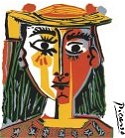
05.12.15 (Iyyar 23, 5775) Since God our heavenly Father knows the number of hairs on our heads, he also knows those character defects that we do not see in ourselves... Nevertheless we must come to God "just as we are," since what we are is ultimately unknowable by us. This implies that we can't wait to turn to God until we have already confessed our sins, since we often do not know what they are. "Those who are well have no need of a physician, but those who are sick" (Mark 2:17), which means that we come in a state of unknowing blindness to find healing. We don't see so we can turn; we turn so we can see. Confession turns to see God's remedy for our sin, and true teshuvah must begin with hope, with the vision that the LORD is our Helper and the Healer of our souls.
Just as King David prayed, שְׁגִיאוֹת מִי־יָבִין מִנִּסְתָּרוֹת נַקֵּנִי, "who can understand his errors; cleanse me from nistarot chata'ot, secret sins" (Psalm 19:12), so we likewise trust that God's remedy for our sin will heal even that which is hidden from our own awareness...
Yeshua taught us of this teshuvah: "And he arose and came to his father. But while he was still a long way off, his father saw him and felt compassion, and ran and embraced him and kissed him..." (Luke 15:20). Note the father saw him "a long way off" and ran to meet him as his child made the first steps back home. Come just as you are, but please, come...
Seeking What is Above...

05.12.15 (Iyyar 23, 5775) "If then you have been raised with Messiah, seek the things that are above, where the Messiah is seated at the right hand of God (לִימִין הָאֱלהִים); focus your thoughts on the things above - not on things here on earth - for you have died, and your life has been hidden with Messiah in God" (Col. 3:1-3). Note that the verb translated "you have died" (ἀπεθάνετε) indicates that your death is a spiritual reality you must accept by faith. You don't "try to die" to the flesh, since that is the fool's errand of man's "religion." No, you trust that God has killed the power of sin and death on your behalf and imparted to you a new kind of life power (John 1:12; Eph 2:5). Because you partake of an entirely greater dimension of reality, namely, the spiritual reality hidden from the vanity of this age, your life is likewise hidden from this world (Col. 3:4). Therefore we are instructed to consciously focus our thoughts (φρονέω) on the hidden reality of God rather than on the superficial and temporal world that is passing away: "For we are looking not to the things that are seen but to the things that are unseen. For the things that are seen are transient (i.e., "just for a season," καιρός), but the things that are unseen are eternal" (2 Cor. 4:18).
Just as you must trust and accept that Yeshua was crucified for you, identifying with you, taking your place in judgment, exchanging his life for your own, so you must trust and accept that you have been crucified with him, and that your old life was taken away and replaced with a new, indestructible nature. In other words, a union is created where his "for me" is answered by my "with him." Χριστῷ συνεσταύρωμαι– "I already have been crucified in Messiah" (Gal. 2:20). Indeed the two go together: to trust in the finished work of Messiah for you is to trust in his finished work within you... When he died on the cross for you, which sins didn't he bear on your behalf? which remedy did he leave unfulfilled?
Note: I am surely not suggesting any "perfectibilty" of the flesh, of course (that's just more religion, after all) but rather perfectibilty of our relationship with God because of the merit of the only true Tzaddik of God, Yeshua our Savior. What God has done will stand forever; his seed is indestructible, and what he calls us to be and to do will therefore never ultimately fail... We overcome because of his perfect love, not by means of our own strength.
Heeding the Call of Hope...

05.11.15 (Iyyar 22, 5775) The only way out of the painful ambiguity of life is to hear a message from the higher world, the Heavenly Voice, that brings hope to our aching and troubled hearts: "Faith comes by hearing the word of Messiah - ῥῆμα Χριστοῦ" (Rom. 10:17). And yet what is the meaning of this message if it is not that all shall be made well by heaven's hand? There is hope, there is hope, and all your fears will one day be cast into outer darkness, swallowed up by God's unending comfort... "Go into all the world and make students (תַּלְמִידִים) of all nations" (Matt 28:19), and that means sharing the hope that what makes us sick - our depravity and despair - has been healed by Yeshua, and that we escape the gravity of our own fallenness if we accept his invitation to receive life in him. "For it is you who light my lamp; the LORD my God outshines my darkness."
כִּי־אַתָּה תָּאִיר נֵרִי
יְהוָה אֱלהַי יַגִּיהַּ חָשְׁכִּי
kee · at·tah · ta·ir · ne·ri
Adonai · E·lo·hai · ya·gi·ah · chosh·ki

"For it is you who light my lamp;
the LORD my God outshines my darkness."
(Psalm 18:28)

Hebrew Study Card
Exercising faith means actively listening to the Eternal Voice, the Word of the LORD that calls out in love in search of your heart's trust... To have faith means justifying God's faith in you, that is, understanding that you are worthy of salvation, that you truly matter to God, and that the Voice calls out your name, too.... Living in faith means consciously accepting that you are accepted by God's love and grace. Trusting God means that you bear ambiguity, heartache, and darkness, yet you still allow hope to enlighten your way.
The Rizhiner Rebbe once said, "Let your light penetrate the darkness until the darkness itself becomes the light and there is no longer a division between the two. As it is written, "And there was evening and there was morning, one day." Yea, the darkness and the light are both alike unto Thee, O LORD, as it is written: "If I say, "Surely the darkness shall cover me, and the light about me be night, even the darkness is not dark to you; the night is bright as the day, for darkness is as light with you" (Psalm 139:11-12).
"To have faith is to perceive the wonder that is here, and to be stirred by the desire to integrate the self into the holy order of being. Faith does not spring out of nothing. It comes with the discovery of the holy dimension of our existence. Faith means to hold small things great, to take light matters seriously, to distinguish between the common and the passing from the aspect of the lasting. It is from faith from which we draw the sweetness of life, the taste of the sacred, the joy of the imperishably dear. It is faith that offers us a share in eternity." - Abraham Heschel
We walk by faith, not by sight - by hearing the Word of God, heeding what the Spirit of God is saying to the heart (2 Cor. 5:7). For now we "see through a glass darkly," which literally means "in a riddle" (ἐν αἰνίγματι). A riddle is an analogy given through some resemblance to the truth, though quite often the correspondences are puzzling and even obscure. Hence, "seeing through a glass darkly" means perceiving obscurely or imperfectly, looking "through" something else instead of directly apprehending reality. This is contrasted with the "face to face" (פָּנִים אֶל־פָּנִים) vision and clarity given in the world to come, when our knowledge will be clear and distinct, and the truth of God will no longer be hidden. Being "face to face" with reality means being free of the riddles, the analogies, the semblances, etc., which cause us to languish in uncertainty... Now we know in part, but then shall we know in whole.
In light of the obscurity of life in this temporary age, we are encouraged not to lose heart, since though our outer self is wasting away, our inner self is being raised into newness (ἀνακαινόω) day by day (2 Cor. 4:16). "For our light and transient troubles are achieving for us an everlasting glory whose weight is beyond description, because we are not looking at what can be seen but at what cannot be seen. For what can be seen is temporary, but what cannot be seen is eternal" (2 Cor. 4:17).
Therefore we "walk by faith, not by sight," as if the invisible is indeed visible. We must stay strong and keep hope, for through hope we are saved (Rom. 8:24). Faith is the conviction (ἔλεγχος) of things unseen (Heb. 11:1). Do not be seduced by mere appearances; do not allow yourself to be bewitched into thinking that this world should ever be your home. No, we are strangers and pilgrims here; we are on the journey to the reach "the City of Living God, to heavenly Jerusalem, to the assembly of the firstborn who are enrolled in heaven" (Heb. 12:22-23). Therefore do not lose heart. Keep to the narrow path. Set your affections on things above since your real life is "hidden with God" (Col. 3:1-4). Do not yield to the temptation of despair. Look beyond the "giants of the land" and reckon them as already fallen. Keep pressing on. Chazak, chazak, ve-nit chazek - "Be strong, be strong, and let us be strengthened!" Fight the good fight of the faith. May the LORD our God help you take hold of the eternal life to which you were called (1 Tim. 6:12). Amen.
The Jubilee Year...
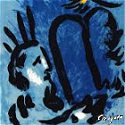
05.11.15 (Iyyar 22, 5775) Our Torah portion this week (parashat Behar) begins with the commandment that an Israelite farmer must let his land remain fallow every seventh year. This is called the "Sabbatical year" (shemittah), and the inhabitants of the land were permitted to glean whatever the farmland produced naturally. In addition, the people were told to count seven cycles of seven years - a total of 49 years - and to mark the arrival of the fiftieth year with blasts of the shofar on the Day of Atonement (i.e., Yom Kippur). This fiftieth year would be a time of "Jubilee" (yovel) – a year of "release" for the land and all its inhabitants. All slaves would be set free, debts would be canceled, and the stewardship of the land would revert to its original titleholders.
In this connection, how do you determine whether a given year is a Sabbatical year (i.e., shemittah)? We take the current Jewish year and divide by seven; if there is no remainder, it is a shemittah year; otherwise it is not (note that the Jewish year begins on Rosh Hashanah, on Tishri 1, in the fall). For example this year (5775) is a Sabbatical Year since 5775 divided by 7 is 825. The Jubilee year (yovel) of course follows the seventh of the seven year cycles (i.e., 7 x 7 + 1), though there are some questions about which iteration (1st, 2nd, ... 7th) is currently active. According to some authorities, the last Jubilee year was in 5727, which means the next would be Yom Kippur 5776, that is, September 22, 2015...
Remembering Jerusalem...
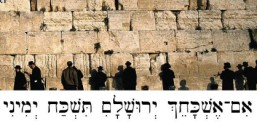
[ Yom Yerushalayim, or Jerusalem Day, is observed May 16th and 17th this year.... ]
05.11.15 (Iyyar 22, 5775) In Israel, "Jerusalem Day" (יום ירושלים) commemorates the re-unification of old city of Jerusalem on June 7th, 1967 during the Six Day War. In 1968 the Chief Rabbinate of Israel declared Iyyar 28 to be a minor holiday to thank God for answering the 2,000-year-old prayer of "Next Year in Jerusalem" (לשנה הבאה בירושלים). On March 23, 1998, the Knesset passed the Jerusalem Day Law, making it a national holiday. This year, "Jerusalem Day" runs from Tuesday, May 27th (after sundown) through Wednesday, May 28th (until sundown). Sha'alu shelom Yerushalayim (Psalm 122:6).
The Hebrew word "Zion" (i.e., tzion: צִיּוֹן) is mentioned over 160 times in the Scriptures. That's more than the words faith, hope, love, and countless other key words of our faith... And since Zion is a poetic form of the word "Jerusalem" (יְרוּשָׁלַםִ), the number of occurrences swells to nearly 1,000! Since it's the most frequently occurring place name in all the Scriptures, it's no overstatement to say that God himself is a Zionist: "Out of Zion, the perfection of beauty, God shines forth" (Psalm 50:2). "The LORD loves the gates of Zion more than all the dwellings of Jacob. Glorious things are said of you, O City of God" (Psalm 87:2-3). Indeed, Yeshua called Jerusalem the "City of the great King" (Psalm 48:2; Matt 5:35): It is the place (הַמָּקוֹם) where He was crucified, buried, resurrected, and ascended to heaven; and is it furthermore the place where He will return to earth (Zech. 14:1-9).
In Psalm 122:6 it is written, שַׁאֲלוּ שְׁלוֹם יְרוּשָׁלָםִ - sha'alu shelom Yerushalayim - "Pray for the peace of Jerusalem," a phrase that reveals prophetic truth about our Savior and Messiah. The word sha'alu (שַׁאֲלוּ) means "you ask" (as in ask a sheilah, a question), shalom (שׁלוֹם) is the name of Yeshua, the Prince of Peace (i.e., Sar Shalom: שַׂר־שָׁלוֹם), and Jerusalem means "the teaching of peace" (Jeru- comes from the same root as the word Torah [ירה], which means "teaching"). The phrase sha'alu shelom Yerushalayim can therefore be construed, "ask about the Prince of Peace and His Teaching." Yeshua is indeed the rightful King of Jerusalem (Matt. 5:35) who is coming soon to reign over all the earth.
שַׁאֲלוּ שְׁלוֹם יְרוּשָׁלָםִ
יִשְׁלָיוּ אהֲבָיִךְ
sha·a·lu · she·lom · ye·ru·sha·la·yim
yish·la·yu · o·ha·va·yikh

"Ask for the well-being of Jerusalem;
May those who love you be at peace" (Psalm 122:6).
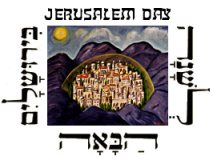
Download Study Card
The Ascension of Messiah...
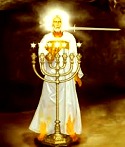
[ Wednesday, May 13th after sundown marks the 40th day of the Omer Count... ]
05.10.15 (Iyyar 21, 5775) We are in the midst of Sefirat Ha-Omer (the "Counting of the Omer"), a 49 day countdown that runs from Nisan 16 through Sivan 5. The first day of the omer count began on the second night of Passover, and the last day occurs the day before the great jubilee of Shavuot ("Pentecost"). On our Gregorian calendars, these dates run from April 4th until May 23rd this year. This is a "countdown period" leading to the giving of the Torah at Sinai and the giving of the Holy Spirit to Yeshua's disciples...
 |
Wednesday May 13th after sundown (Iyyar 25) marks the 40th day of the Omer Count (i.e., Mem B'Omer), the time associated with the ascension of Yeshua back to the heavenly realm (Luke 24:44-53; Acts 1:9-11; Eph. 4:8). A thousand years before the birth of our Moshiah (מוֹשִׁיעַ), David prophesied of the ascension when he announced the Lord's enthronement at the right hand of God (Psalm 110:1; Matt. 22:41-46; 26:64). Recall that Yeshua told His followers that it was good that he would leave them, so that the Holy Spirit (רוּחַ הַקּדֶשׁ), the "Comforter" or "Advocate" (παράκλητος), would be given to them. "But I tell you the truth, it is for your advantage that I am going away. For if I do not go away, the Advocate (ὁ παράκλητος) will not come to you, but if I go, I will send him to you" (John 16:7). Notice that the word translated as "advantage" here is the Greek word συμφέρω (from σύν, "with" and φέρω, "to carry"), which suggests that we would be given power that "carries us" with the Lord during the trials of this life... Bo, Ruach Elohim: "Come, Holy Spirit..."
Note: For more on this, see "Mem B'Omer and the Ascension of Yeshua."
Parashat Behar-Bechukotai...

05.10.15 (Iyyar 21, 5775) This week we will read the final two portions of the Book of Leviticus (i.e., sefer Vayikra), namely, parashat Behar and Bechukotai (בהר־בחקתי). Like a father pities his children, so the LORD pities those who fear Him. Chazak, chazak, v'nitchazek - "Be strong, be strong, and may we be strengthened!"
Why is it, the sages asked, that God bypassed all of the world's great and lofty mountains and chose to give His Torah on the obscure mountain of Sinai? Because God's Spirit (רוח) rests with the lowly, the humble of heart, as it says: "For thus says the One who is high and lifted up, who inhabits eternity, whose name is Holy: "I dwell in the high and holy place, and also with him who is of a contrite and lowly spirit (דַּכָּא וּשְׁפַל־רוּחַ), to revive the spirit of the lowly (רוּחַ שְׁפָלִים), and to revive the heart of the contrite (לֵב נִדְכָּאִים)" (Isa. 57:15). Humility (ענוה) is therefore one of the greatest of middot ha-lev (heart qualities).
The LORD reveals Himself to the contrite and the lowly of spirit, that is, to those who understand their own nothingness and live in utter dependence on Him. Notice that the word dakka ("contrite") refers to being crushed to the very dust, as Yeshua was verily crushed for our iniquities (Isa. 53:10). From the point of view of our dependence on God for salvation, dakka refers to our contrition as we turn to God in genuine teshuvah... Pride, arrogance, and self-righteousness are antithetical to the awareness of God in the truth.
Note: Shalom friends. Please pray for this ministry... Things have been hard for me lately, so please ask our Lord for his favor and grace for this work to continue. Thank you.
All things made new...
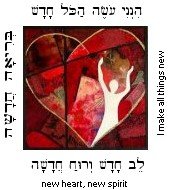
05.08.15 (Iyyar 19, 5775) Only God can help us die to ourselves - to let go of the "self life" and to be set free from the tyranny of what we naturally are... The old nature is never "reformed" by religion but is put to death by a supernatural act of God, as it says: "I have been crucified (συνεσταύρωμαι) with Messiah; it is no longer "I" who live, but Messiah who lives in me. And the life "I" now live in the flesh "I" live by faith in the Son of God, who loved me and gave himself for me" (Gal. 2:20). By faith we trust that we already have been crucified with him, just as by faith we trust that we already have newness of life, though all this is only "theoretical" unless and until the Spirit of God makes it real in our lives: "The wind blows where it wishes, and you hear its sound, but you do not know where it comes from or where it goes. So it is with everyone who is born of the Spirit" (John 3:8). Only the LORD can put a new heart within us; only God can make the new "I" walk in the flesh; only the Spirit can breathe upon dry bones raised from the dust to make them live (Ezek. 37:5).
עֵינַי תָּמִיד אֶל־יְהוָה
כִּי הוּא־יוֹצִיא מֵרֶשֶׁת רַגְלָי
ei·nai · ta·meed · el -Adonai
kee · hoo · yotz·ee · mei·re'·shet · rag·lai

"My eyes are ever toward the LORD,
for he will pluck my feet out of the net."
(Psalm 25:15)

We believe not only that Yeshua died as our substitute for sin - saving us from its penalty - but also that our old nature has died with him - delivering us from its power: "We know that our old self was crucified with him in order that the body of sin might be brought to nothing, so that we would no longer be enslaved to sin" (Rom. 6:6). As it is written: "For by grace you are saved through faith, and this is not from yourselves, it is the gift of God; not a result of works, so that no one may boast. For we are his workmanship (αὐτοῦ γάρ ἐσμεν ποίημα), created in Yeshua the Messiah for good works, which God prepared beforehand that we should walk in them" (Eph. 2:8-10). Note the use of the word "works" and workmanship" in this passage. Human works (ἔργοι) here refer to religious or ethical acts that are performed in order to secure divine favor, and this is contrasted with God's work of righteousness that justifies the one who trusts in Yeshua for salvation. This is a matter of God's "workmanship" (ποίημα) done through the agency of his spirit, and not as a result of our of religious efforts or practices. We are saved by trusting in God's grace alone and healing, though our regeneration initates a process wherein we are made to resemble the image of Messiah, doing works that bear witness of his life and spirit within us (Rom. 8:29; John 15:5). "For as many of you as were baptized into Messiah have put on the Messiah" (Gal. 3:27) [by "baptism" think identification, not some ritual act]. We work out what God has worked in our hearts. May the LORD our God make the truth of what He has done for us alive and breathing freely within us -- by the power of his salvation in Yeshua!
Shabbat shalom dear friends. Please remember this ministry in your prayers. Thank you!
Mercy's Like-for-Like...
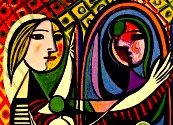
[ The following is related to our Torah reading for this week, Parashat Emor.... ]
05.08.15 (Iyyar 20, 5775) In our Torah portion this week we read, "whatever injury he has given a person shall be given to him" (Lev. 24:20). Some of the sages comment that this is not so much about "eye for eye, tooth for tooth" retributive justice as it is about reciprocity of the will. As you see others, so you will see yourself; as you cause a defect in another, so it will be given to you. Therefore the Baal Shem Tov said, "Other people are like mirrors: the faults we see in others our own." Indeed Yeshua taught us: "condemn not and you will not be condemned; release, and you will be released" (Luke 6:37). As we forgive others, so we find our own forgiveness. "Love covers a multitude of sins" (Prov. 10:12).
Love Believes all things...

05.08.15 (Iyyar 20, 5775) "I would have fainted unless I believed to see the goodness of the LORD..." (Psalm 27:13). Faith is therefore self-authenticating: as you trust in the good, the good will be revealed: believe to see! As Yeshua said, "According to your faith be it done unto you" (Matt. 9:29). And if it is faith that makes you whole, then its lack makes you sick... As you doubt, so you will lose sight of what is real, true, and abiding. Being cynical is cowardly: "There are two ways to be fooled. One is to believe what isn't true; the other is to refuse to believe what is true" (Kierkegaard). The cynic refuses the possibility of truth because he is afraid of being fooled, and for this fear he willingly closes his eyes to the good. "Believe that life is worth living, and your belief will help create the fact" (James). When we trust God's promises, we affirm an unseen good even if the present hour is shrouded in darkness. Faith sees beyond "the seen" to the unseen (2 Cor. 4:18). The "seen" is not ultimately real, and consequently faith is exiled from the vanity of the present hour. Therefore affirm your faith, dear friend; do not allow your heart to waver. Refuse the darkness of fear by choosing to believe in the reality of God's love for your soul, despite the mess you've made of your life. Affirm that God's love is more real, more substantive, and more valuable than anything disclosed in this world that fades away. Amen.
Shelter through the changes...

[ The following is related to our Torah reading for this week, Parashat Emor.... ]
05.08.15 (Iyyar 20, 5775) Our Torah portion for this week (Emor) lists the yearly cycle of Sabbaths and festivals for the people of God (Lev. 23). The sages say that of all the festivals listed, however, the festival of Sukkot (i.e., "Tabernacles") is associated with joy: "On the fifteenth day of the seventh month, when you have gathered in the produce of the land, you shall celebrate the feast of the LORD (חַג־יְהוָה) seven days... and you shall rejoice before the LORD your God" (Lev. 23:39-40). Likewise it is written of Sukkot: "You shall rejoice in your feast... you will be altogether joyful" (Deut. 16:13-15). The festival of Sukkot is associated with joy not only because it celebrates the harvest at the end of the year, but because it celebrates God's care for our lives as we sojourn through this world, and ultimately, celebrates our salvation in the world to come (Zech. 14:16; Isa. 33:20; Ezek 37:27; Rev. 21:3). In this life the sukkah represents our temporary dwelling as we walk through the flux, shadows, and decay of this world, and therefore it symbolizes our mortality, and yet we are to regard the festival as z'man simchateinu (זְמַן שִׂמְחָתֵנוּ), the "season of our joy." We joyfully cry out, "L'Chayim! To Life," as we reflect on the days and seasons that have passed, and especially about the great homecoming we have in the world to come.
The festival of Sukkot teaches us not to deny death, but to rejoice in God's ongoing care for our lives. "For this light momentary affliction is preparing for us an eternal weight of glory beyond all comparison, as we look not to the things that are seen but to the things that are unseen. For the things that are seen are transient, but the things that are unseen are eternal. For we know that if the tent that is our earthly home is destroyed, we have a building from God, a house not made with hands, eternal in the heavens" (2 Cor. 4:17-5:1).
Good Shepherd's Care...
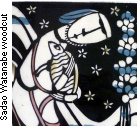
05.08.15 (Iyyar 20, 5775) Where it is written, "the LORD is my Shepherd; I shall not want" (Psalm 23:1), we note that "I shall not want" (לא אֶחְסָר) does not mean "I shall not desire," but rather "I shall not lack." When the Lord is your Shepherd, you can trust that you have all that you need. Note that David uses the future tense here (אֶחְסָר) because God is ahead of your next moment, so to speak: "Your Father knows what you need before you ask Him" (Matt. 6:8). God's Name means Presence, Life, Love, and "I-AM-with-you-always." Yeshua is our Good Shepherd (הָרעֶה הַטּוֹב) who makes us lie down in green pastures, a place of abundant life, and then leads us to still waters, literally "waters of rest" (מֵי מְנֻחוֹת), that will restore your soul (the verb translated "restore" is an intensive passive of the verb shuv, "to turn" (שׁוּב), indicating that the Shepherd causes your soul to return to the Divine Presence). Yeshua said, "My sheep hear my voice, and I know them, and they follow me. I give them eternal life, and they will never perish, and no one will snatch them out of my hand" (John 10:27-28). Yeshua is the one who makes for us the paths of righteousness; He leads us on the way to the Father (John 14:6).
יְהוָה רעִי לא אֶחְסָר
בִּנְאוֹת דֶּשֶׁא יַרְבִּיצֵנִי עַל־מֵי מְנֻחוֹת יְנַהֲלֵנִי
נַפְשִׁי יְשׁוֹבֵב יַנְחֵנִי בְמַעְגְּלֵי־צֶדֶק לְמַעַן שְׁמוֹ
Adonai · ro·i · lo · ech·sar
bi·not · de·she · yar·bi·tzei·ni · al · mei · me·nu·chot · ye·na·cha·lei·ni
naf·shi · ye·sho·vev · yan·chei·ni · ve·ma·a·ge·lei · tze·dek · le·ma·an · she·mo

"The LORD is my shepherd; I shall not lack.
He makes me lie down in green pastures. He leads me beside still waters.
He restores my soul. He leads me in paths of righteousness for his name's sake."
(Psalm 23:1-3)

Hebrew Study Card
"Fear not, little flock, for it is your Father's good pleasure to give you the kingdom" (Luke 12:32). "Be strong and of good courage" - chazak ve'ematz (חֲזַק וֶאֱמָץ). The LORD God promises "never to leave you nor forsake you," and to be with you wherever you go (Josh. 1:5,9; Heb. 13:15, Psalm 139; Matt. 28:20). In the Greek New Testament the wording of Hebrews 13:15 is highly emphatic: "Not ever will I give up on you (οὐ μή σε ἀνῶ); no, not ever will I leave you behind (οὐδ᾽ οὐ μή σε ἐγκαταλίπω)." May you hear the voice of the Good Shepherd calling you, and may He forever keep you under His watchful care. Amen.
Honoring the Sacred...

[ The following is related to our Torah reading for this week, Parashat Emor.... ]
05.07.15 (Iyyar 19, 5775) From our Torah this week we read: לא תְחַלְּלוּ אֶת־שֵׁם קָדְשִׁי- "You shall not desecrate my holy name" (Lev. 22:32), which the sages say is the basis for "kiddush hashem" (קידוש השם), or the duty to always honor God, even if that might mean accepting martyrdom for your faith. Jewish halakhah (law) furthermore says we are to think of kiddush hashem whenever we recite the Shema, that our inmost intent should be self-sacrifice (mesirat nefesh), or the willingness to give up your life to God in complete surrender. After all, if we are not willing to give up our lives for God, how can we be willing to genuinely live for him? The purpose or goal of our existence is to know and love God, to be sanctified in truth, but if we value our carnal lives on earth as more important, we exist in a state of contradiction. Therefore people obsessed with their own physical safety, health, pleasure, happiness, well-being, etc., do not know the true meaning of life. Our lives on this earth were not meant to be an end in themselves, but rather a means to the greater end of knowing and loving the Eternal God. The walk of faith is education for eternity...
כִּי־טוֹב חַסְדְּךָ מֵחַיִּים
שְׂפָתַי יְשַׁבְּחוּנְךָ
ki · tov · chasdekha · me'chayim
sefatai · yeshabechunkha

"Because your lovingkindness is better than life,
my lips will praise you."
(Psalm 63:3)

Download Study Card
Whether we live or whether we die, we belong to the LORD (1 Cor. 10:31; Rom. 14:8).
The Center of Torah...

05.07.15 (Iyyar 19, 5775) The midrash discusses which is the most important and all-encompassing concept of the Torah. One opinion proposes the Shema (הַשְּׁמַע): "Hear O Israel, the LORD is our God, the LORD is One" (Deut. 6:4). Another opinion argues that the Ve'ahavta (וְאָהַבְתָּ) – "You shall love your neighbor as yourself" (Lev. 19:18) is even more important. The last opinion rather surprisingly argues that the most important is: "One lamb you shall offer in the morning, and the other lamb you shall offer at twilight" (Exod. 29:39). The reason this verse is most important is because it represents the continual sacrifice of the Lamb of God offered up on our behalf, called "God's food" and "God's Bread" (Num. 28:2-9). Indeed, the offering of the Lamb of God (שׂה הָאֱלהִים), Yeshua our LORD, is the Center of all Torah, the foundation and focal point of our healing...
What We Really Need...

05.07.15 (Iyyar 19, 5775) "Your heavenly Father knows what you need before you ask him" (Matt. 6:8). We sometimes pray for what we think we need but overlook what we really need. For instance, we may pray for health, material blessing, and opportunity, but what we really need is the ability to trust, the willingness to surrender our lives to God without qualification, and the grace to see the good in others and not their faults. These needs are just as real as our need for food and clothing, since apart from grace to extend empathy and love toward others, we will never be truly happy. Love "overlooks" a multitude of sins; it looks beyond the present moment to see with compassion, of kindness, of empathy... What we really need, then, is to be after God's own heart, to see other people as God sees them, and to overlook matters that offend or feed our sense of pride. This is what we truly need, and therefore we trust that the Lord our God mercifully "decodes" our apparent petitions to express what the Spirit of God groans on our behalf (Rom. 8:26).
כִּי־עָנִי וְאֶבְיוֹן אָנכִי
וְלִבִּי חָלַל בְּקִרְבִּי
ki · a·ni · ve·ev·yon · a·no·khi
ve·lib·bi · chal·lal · be·kir·bi

"For I am poor and needy,
and my heart is stricken within me."
(Psalm 109:22)

The word translated as "stricken" is challal (חָלַל), meaning "wounded, pierced, polluted, defiled, or brokenhearted." This is the condition of heart that is prerequisite for doing real business with heaven. "God has not been trying an experiment on my faith or love in order to find out their quality. He knew it already. It was I who didn't. In this trial He makes us occupy the dock, the witness box, and the bench all at once. He always knew that my temple was a house of cards. His only way of making me realize the fact was to knock it down.... I need Christ, not something that resembles Him." (C.S. Lewis: A Grief Observed)
The Purging Process...

05.06.15 (Iyyar 18, 5775) "I am the true vine, and my Father is the vinedresser. Every branch in me that does not bear fruit he takes away, and every branch that does bear fruit He purges (καθαίρει), that it may bear more fruit" (John 15:1-2). If you bear fruit you will experience the "purging process," and that means suffering affliction... This might seem to you backward: Why does the fruitful branch need to be cut back? Indeed, the promise of suffering is not meant for an evil person, but for the righteous soul who trusts in God. Purging is painful but it is also purifying, yielding new growth within our hearts. Yeshua taught, "Blessed are the pure in heart, for they shall see God" (Matt. 5:8). The Greek word translated "pure" is katharos (καθαρός), sometimes used describe the cleansing of a wound (catharsis), or to describe the unalloyed quality of a substance revealed through refining fire. We "rejoice" in testing because that is the way of real growth, sustained hope, and the revelation of God's deep love (Rom. 5:3-4). In our afflictions we are given heavenly consolation that helps us to persevere (2 Cor. 1:3-5). We are being weaned from this present age to be made ready for heavenly glory, for things unimaginably wonderful, soon to be revealed to you. Chazak – stay strong in the Lord, friends.
טוֹב־לִי כִי־עֻנֵּיתִי לְמַעַן אֶלְמַד חֻקֶּיך
tov li khi-u·nei·ti, le·ma·an el·mad chu·ke·kha

"It is good for me that I was afflicted,
that I might learn your decrees." (Psalm 119:71)

Perfection and Holiness...
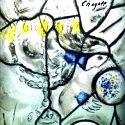
[ The following is related to our Torah reading for this week, Parashat Emor.... ]
05.06.15 (Iyyar 18, 5775) Our Torah portion this week begins by explaining special requirements for Israel's priests, and then goes on to list the yearly cycle of Sabbaths and the seasonal festivals. First of all the priests (kohanim) were required to be "perfect," without any physical defect or uncleanness that might render them unfit for service. Everything about the priests – their clothing, hair style, skin condition, and especially their adherence to the meticulous steps required to offer the daily sacrifice (לֶחֶם אֱלהָיו) - was to be "defect free," and any deviation might incur the penalty of death itself (Lev. 10:2; Num. 4:15, 2 Sam. 6:6-7). On the other hand, what sometimes disqualified a priest were things simply beyond his control, for instance, a variety of physical disabilities such as blindness, having a limp or disfigured limb, and so on (see Lev. 21:16-21).
Thinking about these requirements raises some provocative questions concerning the meaning of "perfection" in our lives, and particularly how we, as a deeply flawed people, can possibly be "perfect." The question is radical and affects how we are to understand practical holiness or the idea of "sanctification": Are we to seek to be perfect people, and if so, how do we understand what this means? Is our spirituality bound up with perfectionism, with flawless performance, and with always being and doing what is right?
In the Sermon on the Mount Yeshua warned that our righteousness should exceed that of the religious leaders of his day (Matt. 5:20), and went on to say: "be perfect, as your heavenly Father is perfect" (Matt. 5:48). Here we note that the Greek word translated "perfect" (τέλειος) may mean "mature" or "fully developed" more than morally flawless, though regarding moral and spiritual practice this distinction is not clear cut, especially if by "mature" we mean godly in character, as the context of Yeshua's statement clearly implies (see Matt. 5:1-48). The Hebrew word translated as "perfect" (תָּמִים) can also mean "complete," but it can connote being "wholehearted," "sound," or even healed (שָׁלֵם). So the question arises, does the word "perfect" mean "flawless" or "healed" -- or perhaps both?
Of course we affirm that God alone is truly perfect (Deut. 32:4; Psalm 18:30), completely good (Matt. 19:17), flawlessly righteous (Psalm 145:17), entirely holy (Isa. 6:3; Rev. 15:4), and peerlessly unique (Exod. 15:11; Jer. 10:6-7), but how can we relate to God's overmastering perfection in the midst of our daily flaws and chronic imperfections? How dare we approach "to offer the bread of God" (Lev. 21:17)?
Followers of the LORD are called to be a nation of priests, a "select people," set apart to serve God in holiness (Exod. 19:5-6; 1 Pet. 2:9; Lev. 11:45), but it is clear we are blemished, imperfect, blind, halt, needy, and unclean... This is common to the human condition: all of us, Jew or non-Jew alike, are broken, flawed, and in the midst of the inevitable flow of life that leads to death and decay (Rom. 3:23). We are sick with sin and unable to heal ourselves, and therefore we need a radical transformation - "deliverance from ourselves" – that must come through divine intervention and the miracle of spiritual rebirth (John 3:3,7).
Yet in this world the paradox still remains: we are finite yet long for the undying, the infinite; we are in flux yet anchored in hope; we are a "new creation" yet still saddled with the old nature; we are made holy yet we live in the midst of the profane; we are purified yet still need cleansing; we are healed yet are still wounded; we are redeemed of God yet still need to turn to God in teshuvah; we die daily yet have eternal life. Our hearts are to be a divine sanctuary, yet we are powerless to make God appear in our midst...
Perfection haunts us; we often confuse the ideal and the real. Our romantic visions fail us; all of us are strangers, wanderers, in lonely exile. And the question then becomes – how do we embrace the "already-not-yet," the process, the fleeting days with their poignant moments – within the context of real hope, a vision that heals and brings us real comfort? How do we make peace with our imperfections, our present darkness, and our hunger for deliverance? How do we envision healing in the midst of our brokenness?
Ironically those defects that disqualify us as priests can be transformed (by grace) into compassion for others, and this can enable us to reach out to God in the midst of our flawed existence... After all, the deepest role of the priest is to draw others near to God, but this requires empathy and awareness of the needs of others. Therefore God clothed himself with our frailty, our infirmities, and the brokenness of our sin in order to redeem us in Yeshua. As it is written, we have a high priest who is able to sympathize (συμπαθέω) with our weaknesses (Heb. 4:15). The priest of the New Covenant is a mediator through through poverty of spirit and mourning (Matt. 5:3-8). Just as Joshua the high priest was graciously given robes of righteousness in exchange for his filthy garments (Zech 3), so we are given an imputed righteousness that comes through trusting in "the One who justifies the ungodly" (Rom. 4:5). "For our sake God made Him (i.e., Yeshua) to be sin who knew no sin, so that in him we might become the righteousness of God" (2 Cor. 5:21). This is a righteousness that is "apart from the law, though the law and prophets testified of it; namely, the righteousness of God given through the faithfulness of Yeshua the Messiah" (Rom. 3:21-22). Our present groaning for the complete deliverance is a gift given by the Spirit of God crying out within our hearts (Rom. 8:22-23).
C.S. Lewis once remarked, "God doesn't love you because you are good, but He will make you good because He loves you." This goodness is the miraculous inner working of an imparted godliness, the divine gift of a new heart and spirit (Ezek. 36:26). Awaken to your eternal perfection in the world to come: "You shall be perfect even as your heavenly Father is perfect" can be read as a prophecy. Do not give up, friends; do not succumb to despair. We must learn to endure ourselves and believe in the healing to come. "Do not lose heart. Though our outer self is wasting away, our inner self is being renewed day by day. For this light momentary affliction is preparing for us an eternal weight of glory beyond all comparison, as we look not to the things that are seen but to the things that are unseen. For the things that are seen are transient, but the things that are unseen are eternal" (2 Cor. 4:16-18). And may God help us walk in perfect faith in His unfailing love (Phil. 3:14).
Note: This topic was meant to provoke us to do some hard thinking and to raise some questions... Yeshua is our perfect "inner priest" who mediates God's love and holiness for us, of course. In Him alone we find peace with God and a place for perfection. Shalom.
Anticipating Shavuot ("Pentecost")

[ The following is related to the holiday of Shavuot, which begins May 23rd this year... ]
05.05.15 (Iyyar 17, 5775) A week is called shavu'a (שָׁבוּעַ) in Hebrew, from a root word sheva (שֶׁבַע) that means seven. Seven is the number of holiness and completion, and the first verse of Torah has seven words (בְּרֵאשִׁית בָּרָא אֱלהִים אֵת הַשָּׁמַיִם וְאֵת הָאָרֶץ). Moreover, in six days God created the heavens and the earth, but on the seventh day he rested and set it apart as sacred (Gen. 2:3). The holiday of Shavuot (שָׁבוּעוֹת), or "weeks," marks the "Jubilee of Passover," which occurs after we count 7x7 (49) days from the day following Passover until we reach Sivan 6 (which this year begins Saturday May 23rd at sundown). Since Shavuot occurs on the 50th day after Passover, the Greek translators of the Torah called it "Pentecost" (πεντηκοστή). Shavuot marks the goal or climax of Passover season, commemorating both the anniversary of the giving of the Torah at Sinai as well as the giving of the Holy Spirit to the followers of Messiah (Acts 1:8; 2:1-4).

The holiday of Shavuot is one of the shelosh regalim (three pilgrimage festivals) given in the Torah (Exod. 23:14-17; Deut. 16:16) and therefore reveals profound spiritual truth for followers of Yeshua (Luke 24:44; 2 Tim. 3:16). God did not want us to miss the significance of this holiday, since it expresses the freedom and truth of the New Covenant of Zion.
Note: For a bit more to help you "attune" yourself to the holiday of Shavuot, see the articles "Preparing for Shavuot" and "The Law of Liberty."
You always Speak Twice...

[ The following is related to our Torah reading for this week, Parashat Emor.... ]
05.05.15 (Iyyar 17, 5775) Our Torah portion this week begins, "And the LORD said to Moses, "Speak (אמר) to the priests, the sons of Aaron, and say (וְאָמַרְתָּ) to them..." (Lev. 21:1). Rashi noted that the repeated verb emor (אמר) has a softer tone than the verb dibber (i.e., "speak," as in a command), suggesting almost a pleading quality: "Speak softly again and again..." The repetition suggests that the priests (i.e., teachers who would serve as examples to Israel) shouldn't simply tell people what to do/believe, but rather they should both tell and gently demonstrate Torah truth in their daily lives. When teaching, we are always speaking twice: once to explain and a second time to ignite a passion.... Likewise we study the "Living Torah" by first learning from Yeshua (Matt. 23:8) and only afterward are we commissioned to go "to all the nations and teach" (Matt. 28:19). Such education for eternity impels us to make fellow-learners (disciples), not simply by imparting intellectual doctrine, but by kiddush HaShem -- by sanctifying the LORD in our lives. In this way we are made a "living letter" that is sent into the world that shares the living message of salvation (2 Cor. 3:2-3). But we must first learn the meaning of what we say before we say it...
Note: For more on this subject, see Parashat Emor: Speaking Twice.
Giving and Receiving...
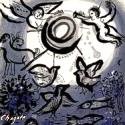
[ The following is related to our Torah reading for this week, Parashat Emor.... ]
05.04.15 (Iyyar 16, 5775) Parashat Emor contains more mitzvot (commandments) regarding holiness than any other Torah portion (the sages identify no less than 63). In addition, the portion provides a list of the eight main holidays, or "appointed times" (i.e., mo'edim: מוֹעֲדִים), found in the Jewish Scriptures. These "festivals of life" are sometimes called mikra'ei kodesh (מִקְרָאֵי קדֶשׁ), "times in which holiness is proclaimed" (Lev. 23:2). Note that this is the first time that the Torah reveals a comprehensive description of the festivals of the year, which include the following:
- The Sabbath - weekly observance of Shabbat that commemorates God as the Creator of the world. According to the sages, Shabbat is the most important of the appointed times, even more important than Yom Kippur and the Ten Days of Awe. There are 54 weekly Sabbaths in a "leap year" and 50 for regular years...
- Pesach (Nisan 15), also called Passover.
- Unleavened Bread (Nisan 15-22); note that the Counting of the Omer is first mentioned in this section of Torah (Lev. 23:9-16).
- Firstfruits (Nisan 17), also called Reishit Katzir.
- Shavuot (Sivan 6), also called Pentecost.
- Yom Teru'ah (Tishri 1), also called Rosh Hashanah (note that this is the first time this is revealed in Torah).
- Yom Kippur (Tishri 10) also called the Day of Atonement.
- Sukkot (Tishri 15-22) also called Tabernacles (note that this is the first time the commandments to dwell in a Sukkah and to wave the arba minim (four species) are mentioned in the Torah).
Notice that there is a restatement of the commandment to leave food for the poor and the stranger (pe'ah, leket, etc.) that appears right in the midst of the list of the Biblical holidays (see Lev. 23:22), which the sages said was intended to remind us to help those in need, especially during these times. Hence the giving of tzedakah is a regular part of the Jewish holidays (e.g., giving ma'ot chittim [מַעוֹת חִטִּים] "money for wheat" during Passover, matanot la'evyonim [מַתָּנוֹת לָאֶבְיוֹנִים] for Purim, and so on). The sages ask, "Why did the Torah place the mitzvah of helping the poor while speaking about the holidays and their particular sacrifices? To teach us the greatness of charity: 'God credits whoever gives charity to the poor as if they built the Holy Temple and presented offerings therein to God.' Indeed, Yeshua taught us that giving a gift to the poor is giving a gift to God Himself (Matt. 25:40).
מַלְוֵה יְהוָה חוֹנֵן דָּל
וּגְמֻלוֹ יְשַׁלֶּם־לוֹ
mal·veh · Adonai · cho·nein · dal
u·ge·mu·lo · ye·sha·lem · lo

"Whoever is generous to the poor lends to the LORD,
and He will repay him for his kindness."
(Prov. 19:17)

Hebrew Study Card
Since there are at least 50 weekly Sabbaths in a Jewish year in addition to the seven prescribed holidays (not to mention Rosh Chodesh and the other holidays such as Purim, Chanukah, Israel Independence Day, etc.), it is no wonder that the Scriptures declare: "A person with a cheerful heart has a continual celebration" (Prov. 15:15). The moedim are times to cheerfully give thanks to the LORD for all He has done....
For more on this subject, see "Appointed Times: Further thoughts on Parashat Emor."
Parashat Emor - אמור

[ The following is related to our Torah reading for this week, Parashat Emor.... ]
05.03.15 (Iyyar 15, 5775) Our Torah portion this week (parashat Emor) lists the eight main holidays revealed in the Jewish Scriptures. In the Torah, these "holidays" are called "appointed times" (i.e., mo'edim: מוֹעֲדִים), a word which comes from a root meaning witness (עֵד). Other words formed from this root include edah (עֵדָה), a congregation, edut (עֵדוּת), a testimony, and so on. The related verb ya'ad (יָעַד) means to meet, assemble, or even to betroth. The significance of the holy days, then, is for the covenant people of the LORD to bear witness to God's love and faithfulness. As it is written:
כָּל־אָרְחוֹת יְהוָה חֶסֶד וֶאֱמֶת
לְנצְרֵי בְרִיתוֹ וְעֵדתָיו
kol · or·chot · Adonai · che·sed · ve·e·met
le·no·tze·rei · ve·ri·to · ve·e·do·tav

"All the paths of the LORD are love and truth
to the ones guarding His covenant and His testimonies."
(Psalm 25:10)

Hebrew Study Card
Metaphorically the paths of the Lord (orechot Adonai) are likened to ruts or grooves created by the wheels of a caravan (i.e., orechah: ארְחָה) passing repeatedly over the same ground. These paths signify the Divine Presence journeying with God's children in this world. In temporal terms, we are able to discern the path by means of the divine calendar. God's love and faithfulness attend to His covenant (brit) and to the commemorations of the yearly "appointed times" that testify of God's faithful love. Keeping God's testimonies, then, means that we will be careful to observe the holidays in order to witness to God's truth...
"Speak to the people of Israel and say to them, 'These are the appointed times of the LORD (מוֹעֲדֵי יְהוָה) that you shall proclaim as holy convocations (מִקְרָאֵי קדֶשׁ); they are My appointed times'" (Lev. 23:2). Note that these hallowed times - the very first of which is the weekly Sabbath - are "of the LORD," and that means they should be regarded as appointments given by God Himself to help draw us closer to Him, to reveal His prophetic truth, and to remind ourselves of His great plan for our lives.
Please see the quick summary for Emor for more information. You can also download the Shabbat Table Talk for this portion here:
Second-Chances and Passover...

05.03.15 (Iyyar 15, 5775) Last night we observed a "second Passover" seder at our home because my brother-on-law missed the seder held on Nisan 14. Indeed, Passover is the only festival that the LORD made special provision so that if someone missed the occasion (on account of illness or some other valid reason), he or she could make it up 30 days later on Iyyar 14 (see Num. 9:9-12), which this year fell on Saturday, May 2nd at sundown. This "second chance Passover" is called Pesach Sheni (פֶּסַח שֵׁנִי) or Pesach Katan ("little Passover"). For some pictures, see the Facebook page.
Prophetically and homiletically, Pesach Sheni reveals God as our urgent Lover, calling us to his table, beckoning to us even if we had somehow overlooked His love of love in the past. Pesach Sheni Samea'ch, chaverim!
Heart of the Sanctuary...

[ The following is related to our Torah this week, Acharei Mot, which concerns the tragic death of the first priests of Israel, Aaron's sons Nadab and Abihu, as they offered "strange fire" before the LORD in the Tabernacle... In response, God gave the avodah of Yom Kippur to stress the sanctity of his provision to provide sacrificial blood before the Throne of Glory represented by the Ark. ]
05.01.15 (Iyyar 12, 5775) The earthy Tabernacle and its furnishings were designed to be "signs" and "shadows" of heavenly realities (Heb. 8:5). Moses was repeatedly commanded to make the Sanctuary according to the "pattern" revealed at Sinai (Exod. 25:9,40). At the inmost center of the earthly Tabernacle, the place symbolizing utmost holiness, was the Ark of the Covenant (אֲרוֹן־הַקּדֶשׁ), a "three-in-one" box that held the tablets of the covenant. The Ark served as a symbol of kisei ha-kavod (כִּסֵּא הַכָּבוֹד), God's Throne of Glory, since it stood entirely apart as the only furnishing in the Holy of Holies (קדֶשׁ הַקֳּדָשִׁים). Upon the crown or cover of the Ark (i.e., the kapporet) were fashioned two cherubim (i.e., angel-like figures) that faced one another (Exod. 25:17-18). According to the Talmud (Succah 5b), each cherub had the face of a child - one boy and one girl - and their wings spread heavenward as their eyes gazed upon the cover (Exod. 25:20; 1 Pet. 1:12). It was here - in the midst of sacred innocence, humility, purity, and hope - that the sacrificial blood was offered to make atonement for our sins, and it was here where God's Voice would be heard (Exod. 25:22; Num. 7:89). In the very heart of the Sanctuary, then, we see the Word of God and the sacrficial blood, foreshadowing the glory of the eternal redemption secured by Yeshua. As is written in our Scriptures: "For Messiah has entered, not into holy places made with hands, which are representations (ἀντίτυπος) of the true things, but into heaven itself, now to appear in the presence of God on our behalf" (Heb. 9:24).
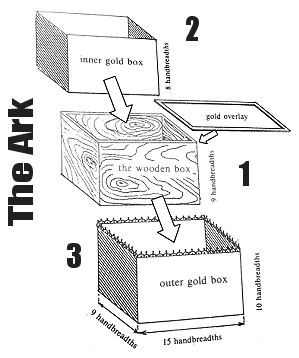 |
Note: The Ark is described as a "three-in-one" box because it was a wooden one set inside a gold one, with another gold one set inside the wooden one -- three boxes made one. Metaphorically this symbolizes Yeshua's humanity (the wood, the Tree of Life) surrounded above and within by God the Father and the Ruach HaKodesh (Holy Spirit).
Sensing the Sacred...
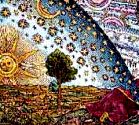
[ The following is related to our Torah reading this week, parashat Acharei Mot-Kedoshim... ]
05.01.15 (Iyyar 12, 5775) The Torah records God's first act of creation with the imperative utterance: "Let there be light" (i.e., yehi or: יְהִי אוֹר), and then goes on to say that "God separated (וַיַּבְדֵּל) the light from the darkness (Gen. 1:3-4). It is this "separation," or distinction, that is foundational to the concept of kedushah (קְדֻשָּׁה), or "holiness." Holiness is also expressed in the distinction between ordinary and sacred time: "God blessed the seventh day and made it holy" (יְקַדֵּשׁ) because on it God rested from all his work that he had done in creation" (Gen. 2:3). Therefore we are repeatedly told to "distinguish between the holy and the common, and between the unclean and the clean" (Lev. 10:10). Note that the word translated "distinguish" (וּלֲהַבְדִּיל) comes from the same verb used to describe how God separated the light from the darkness. In order to do this, we need understanding (i.e., binah: בִּינָה), or the ability to distinguish between (בֵּין) realms of reality. As it is written, "You shall be holy to me, for I the LORD am holy and I have separated you (וָאַבְדִּל) from other people that you should be mine" (Lev. 20:26).
וִהְיִיתֶם לִי קְדשִׁים כִּי קָדוֹשׁ אֲנִי יְהוָה
וָאַבְדִּל אֶתְכֶם מִן־הָעַמִּים לִהְיוֹת לִי
vee·yee·tem · lee · ke·do·sheem · kee · ka·dosh · a·nee · Adonai
va·av·deel · et·khem · meen-ha·a·meem · lee·he·yot · lee

"You shall be holy to me, for I the LORD am holy
and I have separated you from the peoples to be mine."
(Lev. 20:26)

There is no other way to approach the Holy One apart from consciousness of His infinite glory and unsurpassable worth. "I will lift up my eyes to the hills" (Psalm 121:1). As the Holy One (i.e., ha-kadosh: הַקָּדוֹשׁ), the LORD (יהוה) is utterly unique, distinct, sacred, and set apart as the only One of its kind. He alone is worthy of true worship and adoration, since He alone is utterly peerless, without rival, and stands in relation to the world as Creator, Redeemer, and Lord. To affirm the LORD is holy is to be conscious that He is utterly sacred.
Note: Being "holy" does not mean being sanctimonious or having a sour face about the world and its carnal pleasures. It has nothing at all to do with affected spirituality, angry pride, or the fear of becoming unclean... Indeed, some of the most holy moments are those of love, joy, peace, as well as times of struggle, sorrow, affliction, and fiery temptation. Holiness is ultimately "ontological," which means it has to do with reality... A person can be holy and yet sinful; he can be holy and yet feel lost or abandoned. On the other hand, a person can be seemingly sinless, morally upright, and yet be completely unholy.
|


